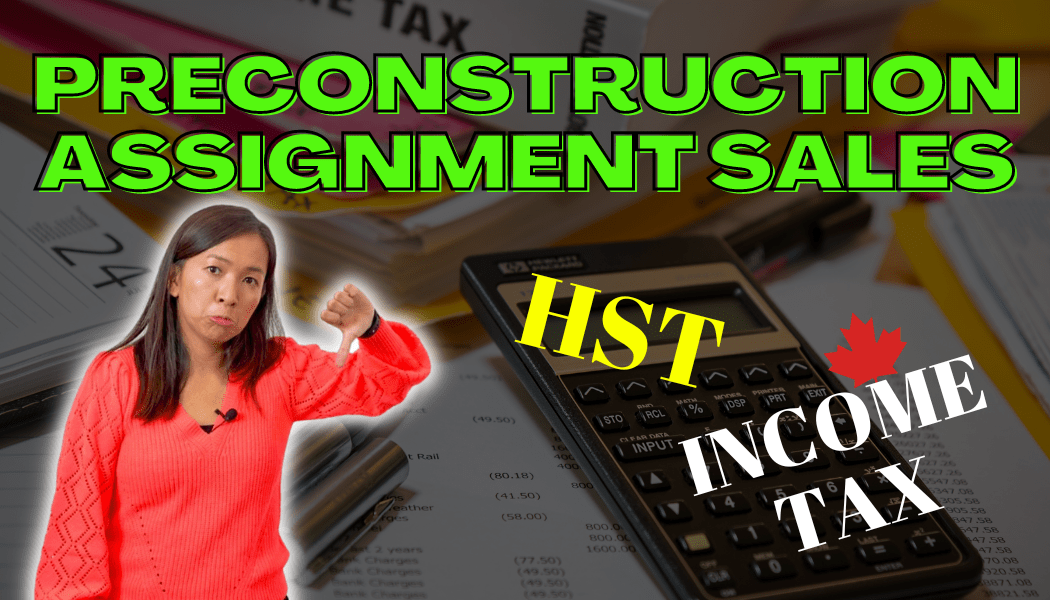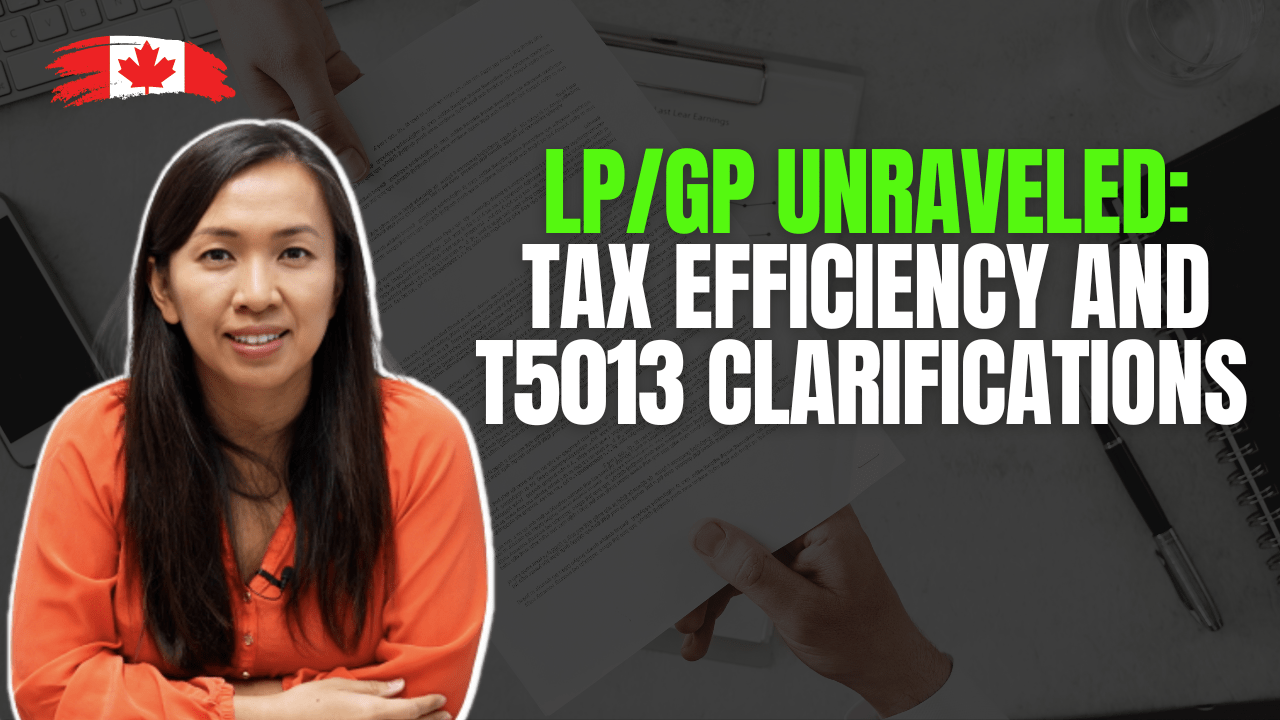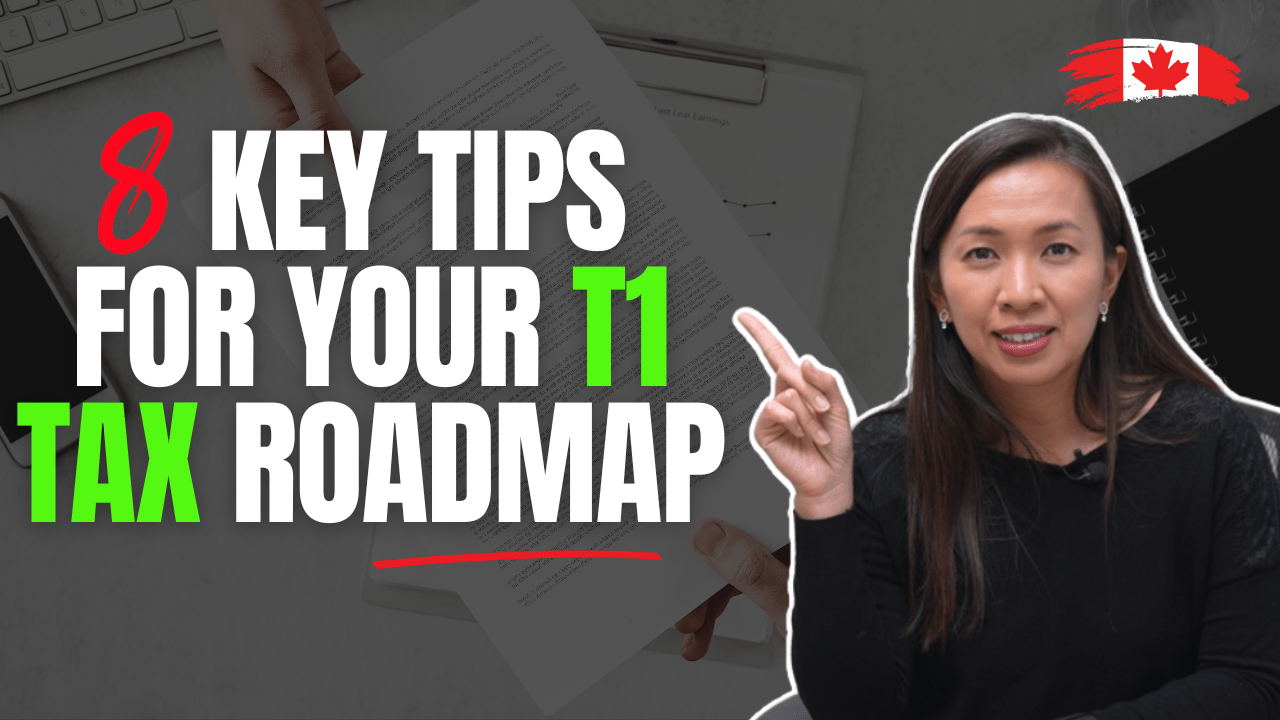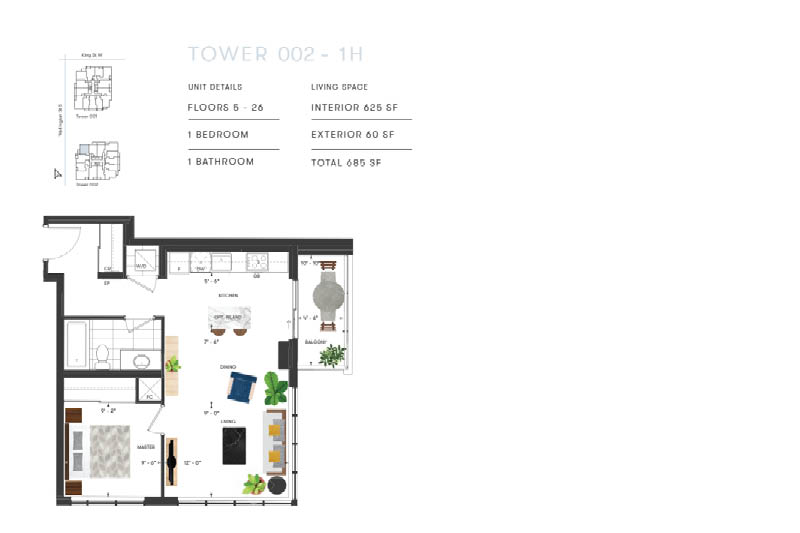
ADVO TAX LAW

PROFESSIONAL CORPORATION
- May 11, 2022
Tax Implications of a Real Estate Assignment: a Tax Exposure Calculator

This article provides an overview of GST/HST and Income Tax rules (current and proposed by the Federal Budget 2022) as they apply to real estate assignments sales.
In order to illustrate the points we discuss in the article, we have created a fun and interactive Assignment Tax Exposure Calculator for real estate assignments in Ontario (HST rate 13%) that result in business income for Income Tax purposes . If your assignment sale results in capital gain for Income Tax purposes, this calculator won't work for you (we might create one for our readers, if there is enough interest). Talk to your tax advisor to determine whether your assignment sale would result in business income or in capital gain.
We hope that our readers enjoy testing their business strategies with our Tax Exposure Calculator as they plan their assignment sales, but we caution them not to rely on the calculator in lieu of professional tax, legal or accounting advice.
Federal Budget 2022
A typical purchase agreement for a pre-construction residential property has a closing date scheduled months, often years in advance. As purchasers wait for the construction to complete/the transaction to close, some choose to assign their rights under the purchase agreement for the property for a fee. Federal Budget 2022 proposes new tax rules that will affect both such assignors and assignees.
Take, for example, Rebecca who purchased a pre-construction condominium in Downtown Toronto in 2017 for $300,000 (including HST) with a November 2022 tentative closing date. She provided a deposit of $60,000 to the builder. At the time of purchase, Rebecca’s intention was to live in the condo. As years went by, Rebecca changed her mind about living in Downtown; she decided to live in the suburbs instead. Lucky for Rebecca, the market value of her pre-construction condo surged to $500,000. In June 2022, Rebecca assigns her rights under the purchase agreement for the condo to a new purchaser who is willing to pay $260,000 ($60,000 to reimburse her for the deposit she made + $200,000 on account of the increase in price). Rebecca thinks she made an impressive profit of $200,000 but she did not consider taxes.
If you are like Rebecca, Federal Budget 2022 has some good news and some bad news for you (but mostly bad).
GST/HST to Apply on All Assignment Sales
The bad news is that effective May 7, 2022, under the Excise Tax Act (Canada) (“ETA”) every individual assignor of residential real estate would have to collect GST/HST on their assignment profit and remit it to the CRA. The rule will apply even to those who believe they are unrelated to the business of real estate and did not have a GST/HST number. Where an assignor is a non-resident, the assignee would be required to self-assess and pay the GST/HST to the CRA. In my example, Rebecca would have to remit 13% HST included in the $200,000 assignment profit ($23,008) directly to the CRA.
Before the Budget proposal, Rebecca’s HST liability depended on whether or not she purchased and assigned a condo in the course of a commercial activity. If Rebecca’s true intentions were to live in the condo, she would have been exempt from HST.
Income from Assignment: Business Income or Capital Gain?
Another element of bad news does not directly follow from the proposals, but raises concerns. Some commentators believe that, as an indirect effect of the Budget, we may see more assignment sales treated as business income (taxed at full rates) as opposed to capital gain (taxed at half rates) under the Income Tax Act (Canada) (“ITA”).
First, if all assignments are “taxable supplies” subject to GST/HST under the ETA, it generally implies the existence of a “commercial activity.” In its turn, a commercial activity generally implies business income treatment under the ITA. Granted, if an activity is deemed to be a “taxable supply” under the ETA, the deeming rule should not extend to a different Act, the ITA, but tax practitioners are watching carefully.
Second, Budget 2022 includes a new “anti-flipping” rule, which deems sales of residential properties owned for less than 12 months to generate business income under the ITA, subject to limited “life events” exceptions, such as a divorce or a job relocation. It is unclear whether the proposed “anti-flipping” rule would apply to assignments when taxpayers technically do not “own” the properties. Stay tuned.
In any event, the new “acceptable” list of life events replaces the current capital vs. income legal test entirely. Instead of determining whether the condo was Rebecca’s capital property or inventory, the focus shifts to merely checking whether her reason to sell/assign was on the list of the “acceptable” ones.
If Rebecca’s assignment profit is treated as business income for income tax purposes, her highest marginal tax rate would be 53.53% in Ontario. In very rough terms, Rebecca should budget well over 50% of her assignment profits for HST remittances and income tax. Depending on her marginal tax rate, she may be able to only keep about $88,000 of her original $200,000 assignment profit.
Before the Budget proposal, Rebecca’s intentions for the property (business or personal) would have been a question of fact. If she could prove that she intended to live in the condo, she would pay no HST and pay tax on capital gain. Her total tax liability would have been approximately $50,000 (25% of the $200,000 assignment profit).
No HST On Deposit Portion of Assignment Price
But there is also good news: the Budget proposes to exclude deposits from consideration for taxable supplies by assignment for GST/HST purposes. This means that GST/HST will only apply on the profit portion of the assignment price (in Rebecca’s case, $200,000), and not on the entire assignment price, which includes the deposit ($260,000). This is a welcome change that eliminates double taxation and is consistent with current caselaw ( Casa Blanca Homes Ltd. v. The Queen , 2013 TCC 338).
To generally estimate Income Tax and HST (Ontario) implications of an assignment that results in a business income, check out the Assignment Tax Exposure Calculator on our website .
IMPORTANT: Always speak to your tax professional to estimate or determine tax consequences applicable to your specific situation. DO NOT rely on our calculator for an accurate estimation of your tax liability. Nothing in this article constitutes legal advice and no solicitor-client relationship is created. If you require legal advice pertaining to your specific situation, please contact our tax lawyer .
If you enjoyed this article, please do not forget to s ubscribe to our blog and our social media for important updates.
~~~~~~~~~~~~~~~~~~~~~~~~~~~~~~~~~~~~~~~~~~~~~~~~~~~~~~~~~~~~~~~~~~~~~~~~~~~~~
#advotaxlaw #annamalazhavaya #taxlawyer #taxlawyerToronto #taxlawyermississauga #taxlawyeretobicoke #taxlitigationlawyer #hst #realestate #gstcanada #torontotax #filingtaxescanada #revenuecanada #canadarevenueagency #taxcreditscanada #hstrebatecanada #hstcanadatax #realestatetoronto #realestatebuilder #residentialbuilder #buildertoronto #intention #principalresidence #craaudit #craappeal #taxcourt #penalties #assignment #preconstruction #budget2022 #businessincome #taxcalculator #taxexposurecalculator #hstonassignment
Recent Posts
2024 Federal Budget Changes in Tax on Capital Gain: What They Mean to "Rich" and "Regular" Canadians
Basic Guide on Bare Trusts for Canadian Taxpayers
The Future of Tax Audits Looks Digital

- Video Presentation
- Our Lawyers
- Our Services
- Video Testimonials – Real Estate
- Video Testimonials – Immigration
- Client Testimonials
- Appointment

HST on Assignments
- Sign-up to our newsletter?

An assignment is a sales transaction that is carried out between the owner (assignor) and the buyer (assignee). The original owner sells the property to the buyer before the original buyer closes on the property. In short, the buyer sells the property to gain any interest or profit on the house by selling the property before they close on the property.
HST on Assignment Sale
The assignor pays the HST on the assignment sale along with the original price. The assignment agreement is prepared, clearly stating the profit on a transaction. It is advisable to hire a Real Estate lawyer to prepare the agreement with all the necessary information.
Important Changes in the HST on Assignment Sales
In the 2022 Federal Budget, two important changes were introduced in the HST on assignments. The changes that will govern the New Home Contract are as follows:
HST on Assignments is Applicable on all New Home Contracts
The government announced that all Assignment agreements for New Homes entered in on or after May 7 th, 2022 are now subject to HST. In the past, the HST on assignments was decided based on the intention of the original buyer, who often paid no HST on assignments. In short, the government has now removed all exemptions, and every New Home Assignment is subject to HST now.
The intention of the original owner is no longer taken into consideration, and all New Home Assignments are now deemed to be a taxable supply to HST.
Deposits are Exempt from HST under Conditions
The government has removed another confusion that often clouded the judgment of whether or not HST is to be paid on the deposit. To exempt the deposit from HST, the Assignment Agreement must include that part of the assignment price is the reimbursement of the deposit paid by the original buyer under the purchase agreement. In short, the writing must clearly state that the assignment price already includes the deposit, so the HST can be exempt.
As stated in the HST Info Sheet GI-120, the HST is only charged to the extent the assignment price exceeds the deposits paid by the assignor in the New Home Contract. The HST does not apply to the original deposit paid by the assignor. However, the above condition must be met. The HST is only payable on any other amount paid to Assignor over and above the deposit.
Nanda & Associate Lawyers Professional Corporation assists Canadian residents and businesses with their HST needs. Get in touch with us today for more details.

Fill In the form below, We will get in touch with you as soon as possible.
Demo Description
This will close in 0 seconds
Language selection
- Français fr
Proposed GST/HST Treatment of Assignment Sales
GST/HST Notices - Notice 323 May 2022
On April 7, 2022, the Minister of Finance Canada tabled Budget 2022 which proposed an amendment to Part IX of the Excise Tax Act. The proposed amendment would make all assignment sales in respect of a newly constructed or substantially renovated single unit residential complex or residential condominium unit taxable.
This publication provides questions and answers regarding the proposed amendment. Any commentary in this publication should not be taken as a statement by the Canada Revenue Agency that the proposed amendment will become law in its current form.
Except as otherwise noted, all statutory references in this publication are to the provisions of the Excise Tax Act (ETA). The information in this publication does not replace the law found in the ETA and its regulations.
If this information does not completely address your particular situation, you may wish to refer to the ETA or relevant regulation, or call GST/HST Rulings at 1‑800‑959‑8287 for additional information. If you require certainty with respect to any particular GST/HST matter, you may request a ruling. GST/HST Memorandum 1-4, Excise and GST/HST Rulings and Interpretations Service , explains how to obtain a ruling or an interpretation and lists the GST/HST rulings centres.
If you are located in Quebec and wish to request a ruling related to the GST/HST, please call Revenu Québec at 1‑800‑567‑4692. You may also visit the Revenu Québec website at revenuquebec.ca to obtain general information.
For listed financial institutions that are selected listed financial institutions (SLFIs) for GST/HST or Quebec sales tax (QST) purposes or both, whether or not they are located in Quebec, the CRA administers the GST/HST and the QST. If you wish to make a technical GST/HST or QST enquiry related to SLFIs, please call 1‑855‑666‑5166.
GST/HST rates
Reference in this publication is made to supplies that are subject to the GST or the HST. The HST applies in the participating provinces at the following rates: 13% in Ontario and 15% in New Brunswick, Newfoundland and Labrador, Nova Scotia and Prince Edward Island. The GST applies in the rest of Canada at the rate of 5%. If you are uncertain as to whether a supply is made in a participating province, refer to GST/HST Technical Information Bulletin B-103, Harmonized Sales Tax – Place of Supply Rules for Determining Whether a Supply is Made in a Province .
Table of Contents
Proposed amendment, definitions, questions and answers.
An assignment sale in respect of residential housing is a transaction in which a purchaser (an assignor) that has entered into an agreement of purchase and sale with a builder of a new house sells (assigns) their rights and obligations under the agreement of purchase and sale to another person (an assignee). The agreement that details the terms of the assignment of an agreement of purchase and sale (the assignment sale) is generally referred to as the assignment agreement.
For purposes of this notice, a house includes a detached or semi-detached house, a duplex, a condominium unit, a townhouse, a unit in a co-operative housing corporation, a mobile home (including a modular home) and a floating home.
Under the current GST/HST rules, an assignment sale made by a person that is not an individual in respect of newly constructed or substantially renovated residential housing is generally taxable, whereas an assignment sale made by an individual may be either taxable or exempt. An assignment sale made by an individual is generally taxable if the individual had originally entered into the agreement of purchase and sale with the builder for the primary purpose of selling their interest in the real property. If, on the other hand, the individual had originally entered into the agreement of purchase and sale for another primary purpose (for example, to occupy the house as a place of residence), the assignment sale is generally exempt. Any amount an assignor paid as a deposit to a builder is included in the consideration for a taxable assignment sale. For more information on the current GST/HST rules, refer to GST/HST Info Sheet GI-120, Assignment of a Purchase and Sale Agreement for a New House or Condominium Unit .
The proposed amendment to the ETA would make all assignment sales, including those made by individuals, in respect of newly constructed or substantially renovated residential housing taxable for GST/HST purposes. Furthermore, the proposed amendment would exclude any amount attributable to a deposit paid by an assignor to a builder from the consideration for a taxable assignment sale, when certain conditions are met. The proposed amendment would apply to all assignment agreements entered into after May 6, 2022.
The proposed amendment adds section 192.1 to the ETA. Proposed section 192.1 states that if a taxable supply by way of sale of a single unit residential complex (as defined in subsection 254(1)) or of a residential condominium unit is made in Canada under an agreement of purchase and sale (in this section, referred to as the purchase agreement) entered into with a builder of the single unit residential complex or of the residential condominium unit and if another supply by way of assignment of the purchase agreement is made by a person (other than the builder) under another agreement, then the following rules apply:
- the other supply is deemed to be a taxable supply, by way of sale, of real property that is an interest in the single unit residential complex or residential condominium unit
- the consideration for the other supply is deemed to be equal to the amount determined by the formula:
Proposed section 192.1 applies in respect of any supply by way of assignment of an agreement of purchase and sale if the supply is made after May 6, 2022.
Proposed section 192.1 applies to a single unit residential complex or a residential condominium unit.
Single unit residential complex means a residential complex that does not contain more than one residential unit, but does not include a residential condominium unit.
For the purposes of the proposed amendment, a single unit residential complex also includes:
- a multiple unit residential complex that does not contain more than two residential units (for example, a duplex)
- any other multiple unit residential complex if it is described by paragraph (c) of the definition of residential complex in subsection 123(1) and contains one or more residential units that are for supply as rooms in a hotel, motel, inn, boarding house, lodging house or similar premises and that would be excluded from being part of the residential complex if the complex were a residential complex not described by that paragraph (for example, a bed and breakfast establishment)
Residential condominium unit means a residential complex that is, or is intended to be, a bounded space in a building designated or described as a separate unit on a registered condominium or strata lot plan or description, or a similar plan or description registered under the laws of a province, and includes any interest in land pertaining to ownership of the unit.
1. I am an individual who entered into an assignment agreement before May 7, 2022. Is the assignment sale taxable?
If an assignment agreement is entered into before May 7, 2022, the current GST/HST rules apply. This means that the assignment sale may be either taxable or exempt. An assignment sale made by an individual is generally taxable if the individual had originally entered into the agreement of purchase and sale with the builder for the primary purpose of selling their interest in the real property. If, on the other hand, the individual had originally entered into the agreement of purchase and sale for another primary purpose (for example, to occupy the property as a place of residence), the assignment sale is generally exempt.
Under the current GST/HST rules, if an assignor’s sale of their interest in the real property to an assignee is taxable, the total amount payable for the sale of the interest is subject to the GST/HST, including any amount the assignor paid as a deposit to the builder, whether or not such an amount is separately identified.
For more information, refer to GST/HST Info Sheet GI-120 .
2. The assignor already paid a deposit under the purchase and sale agreement. Is the portion of the assignment sale that is attributable to the deposit taxable?
Typically, the consideration for an assignment sale includes an amount attributable to a deposit that had previously been paid to the builder by the assignor. The application of the GST/HST to the amount attributable to the deposit in the context of the assignment sale depends on the date the assignment agreement was entered into and not on the date the deposit was paid to the builder.
Where an assignment agreement is entered into before May 7, 2022, and the assignment sale is taxable, the total amount payable for the sale of the assignor’s interest to the assignee is subject to the GST/HST, including any amount the assignor paid as a deposit to the builder, whether or not such an amount is separately identified.
Where an assignment agreement is entered into on or after May 7, 2022, and the assignment agreement indicates in writing that a part of the consideration is attributable to the reimbursement of a deposit paid by the assignor to the builder under the purchase and sale agreement, the proposed amendment excludes the amount attributable to the deposit from the consideration for a taxable assignment sale.
3. Who is responsible for remitting the tax on the assignment sale under the proposed amendment?
The proposed amendment does not change who is responsible for remitting the tax on the assignment sale. The assignor in respect of a taxable assignment sale would generally continue to be responsible for collecting the GST/HST and remitting the tax to the Canada Revenue Agency (CRA). Where the assignor is a non-resident of Canada, the assignee would continue to be required to self-assess and pay the GST/HST directly to the CRA.
For more information, refer to Guide RC4022, General Information for GST/HST Registrants .
4. Will the proposed amendment affect the new housing rebate?
The amount of a new housing rebate under the GST/HST legislation is determined based, in part, on the total tax paid and the total consideration for a taxable supply of a house, which includes any other taxable supply of an interest in the house (for example, the tax and consideration paid by an assignee for a taxable assignment sale). As a result of the proposed amendment, where an assignment agreement is entered into after May 6, 2022, the GST/HST applies to assignment sales that were not otherwise taxable, and the amount attributable to a deposit is excluded from the consideration for all taxable assignment sales. Consequently, the proposed amendment may have an impact on both the total tax paid and the total consideration for the taxable supply of a new house, which may affect the amount of a GST/HST new housing rebate in respect of the GST or the federal part of the HST, or of a new housing rebate in respect of the provincial part of the HST, that may be available in respect of a new house.
Only one new housing rebate application can be made for each new house. Therefore, an assignee purchaser cannot submit a rebate application through a builder (Builder A) for the tax paid to Builder A on the purchase of the house and submit a second rebate application for the tax paid to the assignor on the purchase of the interest in the house. In such cases, the assignee purchaser may want to file their new housing rebate application directly with the CRA rather than through Builder A. In this way, the assignee purchaser can include in the new housing rebate application the tax paid to Builder A and the tax paid to the assignor in determining the amount of their GST/HST new housing rebate and, where applicable, a provincial new housing rebate.
For more information, refer to Guide RC4028, GST/HST New Housing Rebate .
5. Will the proposed amendment affect the new residential rental property rebate?
The amount of a new residential rental property rebate (NRRPR) under the GST/HST legislation is determined based, in part, on the total tax payable in respect of a residential complex and the fair market value of the qualifying residential unit that forms part of the complex at the time the GST/HST becomes payable on the purchase of the complex. As a result of the proposed amendment, where an assignment agreement is entered into after May 6, 2022, the GST/HST applies to assignment sales that were not otherwise taxable, and the amount attributable to a deposit is excluded from the consideration for all taxable assignment sales. Consequently, the proposed amendment may have an impact on the total tax payable in respect of the complex, which may affect the amount of a GST/HST NRRPR in respect of the GST or the federal part of the HST, or of an NRRPR in respect of the provincial part of the HST.
For more information, refer to Guide RC4231, GST/HST New Residential Rental Property Rebate .
Further information
All GST/HST technical publications are available at GST/HST technical information .
To make a GST/HST enquiry by telephone :
- for GST/HST general enquiries, call Business Enquiries at 1‑800‑959‑5525
- for GST/HST technical enquiries, call GST/HST Rulings at 1‑800‑959‑8287
If you are located in Quebec , call Revenu Québec at 1‑800‑567‑4692 or visit their website at revenuquebec.ca .
If you are a selected listed financial institution (whether or not you are located in Quebec) and require information on the GST/HST or the QST , go to GST/HST and QST - Financial institutions, including selected listed financial institutions or:
- for general GST/HST or QST enquiries , call Business Enquiries at 1‑800‑959‑5525
- for technical GST/HST or QST enquiries , call GST/HST Rulings SLFI at 1‑855‑666‑5166
Page details
Everything you need to know about Preconstruction Assignment Sales

Have you sold pre-construction homes before closing on assignments?
Have you wondered about what are the tax implications on selling pre-construction homes before closing?
We often advise our clients to not to sell their pre-construction homes before closing if possible. It can trigger a series of tax implications – HST and income tax implications.
Before the announcement of Budget 2022, CRA had adopted the policies that HST would be applicable on not just the assignment fees, but also the deposit.
This could be a huge tax cost that most investors weren’t aware of.
Now, let’s use an example to explain .
Say you agree to purchase a pre-construction home for $700,000. You sign the agreement of purchase and sale and pay a deposit of $100,000 to the builder.
The new home is expected to be completed a few years later.
You decided to sell the property on assignment before it’s ready for closing for an additional $50,000.
Scenario 1: When you signed the agreement of purchase and sale, you intended to move into the property and use it as your primary residence.
Life circumstances change. You now decided to sell the property before closing. You sold it on assignment before May 6, 2022 .
HST: As your intention was to move into the property as your primary residence, you had no HST liability obligation.
Again, intention is subjective. If you’re questioned in court, you would have to provide evidence to prove your own intention.
Most clients thought that the CRA would have to prove that they were wrong. The truth however is that the taxpayers are the one who have the responsibility to prove to CRA their own filing position.
Make sure your have documentation proving your initial intention.
Income Tax: Assuming you have strong documentation proving that you did intend to purchase this pre-construction home as your primary residence, the $50,000 assignment fees could be reported as capital gain.
Scenario 2: When you signed the agreement of purchase and sale, you intended to move into the property and use it as your primary residence.
Life circumstances change. You now decided to sell the property before closing. You sold it on assignment after May 6, 2022 .
Budget 2022 changed the rule. For all assignment sales happened after May 6, 2022, regardless of your intention, you’re required to pay HST on the assignment sales.
HST implication:
This means that the $50,000 collected is no longer all yours. This $50,000 collected, if you don’t charge HST on top, is inclusive of HST.
You must remit the HST to CRA on sale on assignment. In this case, it would have been $5.8K.
Presumably, you would also be able to claim Input Tax Credit, which is the HST you paid on services that you used to allow you to sell the property. This includes the HST you paid on your legal cost and HST you paid on brokerage fees.
The net amount can be remitted to CRA.
Income Tax Implication:
Budget 2022 also made some rule changes when it comes down to sale of property. The sale of a property within one year of ownership is considered on income account, meaning 100% of the profit you make is taxable, with some exceptions allowed, effective Jan 1, 2023.
When you apply this new rule to this scenario, it is unknown as to whether an assignment sale is considered a flipped property. It’s difficult to say whether this rule is applicable to assignment sale at this point.
Regardless, you still would need to keep proper and relevant documentation supporting your intention that you were trying to move into the property as your primary residence. With proper documentation, you could still report the net income from assignment sale on capital account, meaning only 50% of the profit you make is taxable.
In our example, assuming client didn’t incur other cost of selling, the client would be reporting $44K of capital gain, 50% of which would be taxable.
Scenario 3: When you signed the agreement of purchase and sale, you intended to rent out your property.
Interest rate changed. You now decided to sell the property before closing. You sold it on assignment before May 6, 2022 .
Your intent was never to move into the property as your primary residence or have any of your family members moving in, as a result HST is applicable on assignment sale.
Assignment fees are subject to HST. $50,000 assignment fees you collected are subjected to HST.
CRA also adopted the position that the deposits $100K are also subject to HST as well. Ouch!
You thought you made $50,000 – but after considering the HST on assignment fees $5.8K and HST on deposits $11.5K, you really only net $33K.
This calculation hasn’t considered the brokerage fees as well as the lawyer fees yet. Yikes!
Income Tax implication:
The net amount profit of $33K (assuming there’s no brokerage fees or lawyer fees, if you have, the net profit is lower) would likely have to be reported as income, 100% of it is taxable.
If you own the property in your personal name, the entire amount is added to your job income or whatever income you have in your personal name. You’re taxed at the respective marginal tax rates, which can be as high as 53.5% in Ontario.
Triple Yikes!
If you own the property in the corporation, the profit is taxed as regular business income, most likely at 12.2% for qualified small businesses.
Scenario 4: When you signed the agreement of purchase and sale, you intended to rent out your property.
Interest rate changed. You now decided to sell the property before closing. You sold it on assignment AFTER May 12, 2022 .
The Government also recognized that charging HST on deposits were not right. Budget 2022 specified that HST would no longer be charged on deposits .
Assignment fees are subject to HST but deposits are not subject to HST anymore to avoid double taxation.
Assignment fees are reported as income 100% taxable.
So continuing with the same example, HST is applicable on the $50,000 assignment fees, meaning that you would incur HST liability of $5.8K as calculated above.
Again, you could offset the HST liability with the HST you pay on realtor commission as well as lawyer fees on closing.
The net amount would have to be paid to CRA.
The net profit of $44K (assuming there’s no brokerage fees or lawyer fees, if you have, the net profit is lower) would likely have to be reported as income, 100% of it is taxable.
Similar to Scenario 3, if you own the property in your personal name, the entire amount is added to your job income or whatever income you have in your personal name. You’re taxed at the respective marginal tax rates, which can be as high as 53.5% in Ontario.
Now that we’ve gone through the assignment sales tax implication in details – Are you still planning to sell your properties on assignment?
Let us know below.
Lastly, our team has been working tirelessly to prepare for the upcoming Wealth Hacker Conference on preparing everyone for the upcoming recession. We have experts such as Dalia sharing her insights on how to protect your portfolio and grow from this recession. If you are lost, join us at the upcoming Wealth Hacker Conference.
Visit WealthHacker.ca now to get your tickets.
Until next time, happy Canadian Real Estate Investing.
Cherry Chan, CPA, CA
Your Real Estate Accountant
Related Posts

How to Maneuver Through the Tax Hike in the Federal Budget

The Unfair 2024 Federal Budget

LP/GP Unraveled: Tax Efficiency and T5013 Clarifications for Investors

Your T1 Tax Roadmap: 8 Key Tips for a Smooth Journey
Hit enter to search or ESC to close

Tax on Assignment Sales: What You Need to Know

Real estate assignment sales and flipping pre-construction condos have become popular strategies for investors looking to make a quick return. And CRA has noticed. In this blog, I will explain two ways CRA is cracking down on pre-construction investors and what you can do to minimize your tax paid on assignment sales.
#1 – CRA May Tax Assignment Sales as Business Income
Similar to selling a resale home, you are required to report an assignment sale on your tax return and pay the necessary tax. Many real estate investors are quick to assume that the profit from an assignment sale is a capital gain.
However, CRA may tax assignment sales in two ways:
- Capital gain – where only 50% of the profit is taxable
- Business income – where 100% of the profit is taxable
To make its determination, CRA will consider factors such as:
- What was your motive or intention in buying the property?
- How long did you hold the property before selling?
- Do you have a history of similar transactions?
- What is your reason for selling?
Based on past court cases, we know that CRA will generally consider the profit from assignment sales to be business income unless you have a compelling explanation.
With the potential to double its tax collection, you can bet that CRA is watching this closely!
#2 – CRA May Assess GST/HST on Assignment Sales
This is probably one of the most overlooked tax implications when it comes to assignment sales.
While resale homes are generally exempt from GST/HST, you may be surprised to learn that this may not be the case with assignments.
Similar to income tax, CRA will look at your intentions in buying the property to determine whether GST/HST applies to you.
For example, you are likely considered a “builder” and will have to charge GST/HST if you assign a pre-construction unit that you bought for the purpose of flipping to make a quick profit.
And it gets worse:
Not only do you have to charge GST/HST on your profit, you also have to charge GST/HST on the deposit you recoup from the buyer!
Since most real estate contracts embed GST/HST into the sales price, this cost will likely be borne by the assignor.
Let’s look at an example:
Scenario Luca purchased a pre-construction condo unit for $450,000 a couple of years ago. He paid a deposit of $90,000 to the builder. The unit is currently worth $575,000. Luca had always planned to buy this unit as an investment and assign it for a profit. He has a personal tax rate of 50%.
On the surface, it looks like Luca stands to make a great profit. But, let’s see how that holds up:
What Can You Do to Save Tax on Assignment Sales?
Firstly, if you are unsure whether you have a capital gain or business income, you should reach out to a tax professional for advice.
Secondly, if the profit on your assignment sale is in fact business income because of the factors discussed above, then you should consider incorporating.
The benefit here is that business income is usually taxed at low rates inside a corporation (about 12.2% in Ontario and 11% in British Columbia). This is much lower than the the top tax rate of 53% paid by individuals.
Now be warned:
Setting up a corporation for real estate investing is not for everyone. Be sure to consult with a tax professional before implementing this strategy.
Lastly, it is important to work with an experienced real estate lawyer to discuss your GST/HST options. In my experience, it may be possible to restructure an assignment sale to reduce the GST/HST you pay as an assignor.
In Luca’s case, with the right professionals on his team, he was able to restructure the deal to reduce his taxes by about 38% (50% less 12.2%), pay less GST/HST and put this money into his next real estate project.
Have qu estions about flipping pre-construction real estate? Contact us for a consultation.
The content of this blog is intended to provide a general guide to the subject matter. Professional advice should be sought about your specific circumstances.

95 Mural St., Suite 600, Richmond Hill, ON L4B 3G2
905.731.8108

- All Listings
- Places with Parking
- All of Ontario
- Assignments
- Only at Condo Culture
Top Neighbourhoods
- Innovation District, Kitchener
- Bauer District, Kitchener
- City Centre District, Kitchener
- Midtown, Kitchener
- Belmont District, Kitchener
- Uptown, Waterloo
- How We Help You Invest
- Highest Appreciation Properties
- Cash Flow vs ROI
- Buying vs. Renting
- How We Help Buyers
- Renting vs. Buying - A Case Study
- Buying An Assignment
- Pet-Friendly Buildings
- How We Help Tenants
- How We Help Landlords
- Ontario's Standardized Lease
Selling With Condo Culture
- How We Help Sellers
- Condo Sellers Guide
- About Condo Assignment Selling
- Selling Assignments and HST
- Selling a Condo with a Tenant
Your Property
- What's Your Property Worth?
- All Buildings
New Developments
Top buildings.
- Caroline Street Private Residences
- Midtown Lofts
- Bauer Lofts
Top Communities
- Station Park, Kitchener
- Garment District, Kitchener
- Kaufman Lofts, Kitchener
- Blackstone, Waterloo
- Seagram Lofts, Waterloo
- DUO at Station Park
Buying in a New Development
- 5 Things to Know when Buying Pre-Construction
- Pre-Construction vs. Resale Investing
How HST Applies to Selling Assignments As of May 7th 2022

By Condo Culture
There have been plenty of conversations amongst the real estate community and assignment sellers regarding the Federal government announcing that they will be making HST payable on profits made by either end-user buyers or investors, effective May 7th, 2022.
Here’s What Has Changed
This additional charge has always been in place with HST on profits being the responsibility of the Seller. There were specific workarounds in place which won’t apply anymore. This regulation already applied to investors, so nothing changes with this particular type of purchaser. The government essentially wants to tighten up on end-users purchasing a pre-construction unit and subsequently assigning. So moving forward, regardless if the intention was to move into your unit as an end-user, any profit from any assignment sale will now be subject to HST .
Savings - Have a Professional Team On Your Side
Even if you’re an end-user buyer and need to sell your unit for whatever reason as an assignment sale, you can deduct certain expenses from your profit to reduce the amount of HST you pay. The commission of your REALTOR®, lawyer and accountant fees, other assignment-related costs, upgrades to the property, and additional ones are potentially eligible. It’s certainly possible to save between 15% to 20% on what you need to pay for HST based on leveraging applicable deductions.
We highly recommend having an experienced REALTOR®, accountant, and lawyer representing you who all have experience with assignment transactions. Your team can help you navigate through the process from start to finish and beyond, so there are no surprises along the way and to ensure you feel comfortable knowing that you didn’t pay more in HST than you need to in order to maximize your ROI.
Condo Culture has a vast amount of expertise handling all types of assignment transactions and we are all over new regulations as they morph and change over time, so be sure to reach out for any of your assignment selling or buying needs. Assignments can offer unique value given their off-market nature with less buyer competition. They are a great option to review as you explore all possible Condo purchase possibilities.
A Simple Assignment Selling Example
When selling an assignment unit, you pay HST on the deposits made on the purchase, plus the 13% on the home’s increase in value once the deal is complete.
Let’s look at an example - if you originally bought a condo for $450K and ultimately sold it as an assignment listing for $650K, then you will need to pay an additional 13% HST on the increase of $200K minus any deductions as outlined above.
Current Exclusive Assignment Opportunities
We have a bunch of fantastic assignment buying options available right now, including these two beauties.
Unit 1012 at Station Park in Tower 1

Highlights:
🛌 2 bedrooms 🛀 2 bathrooms 🚘 1 parking spot 🔐 1 locker ⏹ 810 sq.ft. + a 45 sq.ft balcony ⬆ $18.5K in upgrades on the kitchen and bathroom. Corner unit facing King Street with stunning city views. Expected occupancy: Fall 2022 List price: $699,900
Analysis: This spectacular two-bedroom condo is in a highly sought-after corner unit looking out onto King Street. It’s well priced at $864/sq.ft. and that includes almost $20K in gorgeous upgrades along with a premium lighting package addition, plus a parking spot, as well.
Unit 512 at Station Park in Tower 2

🛌 1 bedroom 🛀 1 bathroom ⏹ 625 sq.ft. + a 60 sq.ft balcony ⬆Entertainment package upgrade included. Corner unit facing both King and Wellington Street with nice 5th-floor views. Expected occupancy: Early 2023 List price: $510,000
Analysis: This wonderful corner unit has a solid price per square foot at $816 including an entertainment package that has been added. It has a generous amount of space for a 1 bedroom unit and a good-sized balcony to lounge, dine, and entertain
We have helped hundreds of clients navigate the unique assignment selling and buying process, and would love to leverage our deep experience to help you succeed with your future transactions. In addition to our Assignment expertise, we are also experts in Condo Resale and Pre-Construction transactions - we are a full spectrum condo brokerage that’s at your service!
To learn more about our assignment selling and buying approach and unique expertise, be sure to read this informative article and connect with us if you have any questions or got any type of condo business to take care of.
Share This Post
- 1759 Avenue Road Toronto - M5M-3Y8
- Contact Us By Dialing 416-250-6400
- Working Hours Mon - Sat 8:00 to 18:00
Assignment Sales and HST
An assignment sale is a type of real estate transaction that occurs when a buyer of a pre- construction home or condo decides to sell their rights to purchase the property to another buyer before the construction of the building is complete. This type of sale transfers the purchase agreement from the original buyer to the new buyer (known as the “assignee”)
As of May 2022, the government introduced a new rule requiring HST (Harmonized Sales Tax) to be paid on all assignment sales of single-unit residential or condo properties that are newly constructed or renovated. This means that the assignee must pay HST on the difference between the original purchase price and the resale price.
For example, if a pre-construction home was originally purchased for $500,000 and then sold as an assignment sale for $600,000, the assignee must pay $13,000 in HST (calculated as 13% of $100,000, which is the difference between the original purchase price and the resale price).
It is the responsibility of the lawyers involved in the transaction to make sure that the HST portion is remitted correctly, taking into account various factors such as the date of the assignment and the completion date of the building.
Despite the introduction of HST, an assignment sale still continues to have many benefits, such as being a more convenient way for original buyers to sell their rights to the property without having to go through hurdles of selling a fully completed property.
- Privacy Policy
- Website Terms
- Cookies Policy
- Payment Terms
- Why work with us
All Website Contents and Advertising Contents are The Exclusive Property of Cactus Law
We're growing. Join our firm. Learn more about Careers at Schwarz Law.

- Firm Profile
- Testimonials
- Environmental Actions
- Jayson Brian Schwarz
- Konrad Grzymski
- Robin Hammond
- Patrick Squire (Associate Counsel)
- Corinne Lobe (Patent Counsel)
- Corporate and Commercial Business Law
- Commercial Real Estate, Financing & Land Development
- Wills and Estate Law
- Articles & News
- Associate Firms
- Affiliated Firms
HST on Assignments

By: Jayson Schwarz LLM and Hamza Ahmad JD
Many clients think that doing an assignment of a home purchase agreement is a simple transaction, but the reality is far different. It is an extremely complex transaction and if not handled properly can result in the loss of a lot of money. This article describes two issues relating to HST that assignors (seller) and assignees (buyer) should consider when entering pre-construction freehold and condominium assignments.
HST on Assignment Fees
HST is payable on an assignment sale of an Agreement of Purchase and Sale (“APS”). Remember when you do an assignment you are not selling the house or property you are selling your APS. The issue is what you pay the HST on, who pays it and how much that will be. Generally the HST will be in addition to the price and paid for by the buyer.
Your assignment agreement must be clear to show what the profit is on the transaction, as it should only be the profit that is subject to HST.
The standard realtor’s form of an assignment agreement does not include sections on crucial issues regarding HST. It is important you get a lawyer to help carefully draft the assignment agreement to reduce the risk of future issues with CRA. In a resale home situation HST is payable on the profit only provided the assignment agreement is properly drafted.
As an interesting aside, most people would reasonably conclude that getting back your deposit is not subject to HST, but CRA takes the position it is, even after CRA lost in Court and the Court said there is no HST on deposit returns!!!!!!
HST New Housing Rebate
Adjustments on closing can surprise homebuyers new to pre-construction properties and assignments only add to the potential shock. The builder will want to collect the HST on closing of the original purchase where there has been an assignment sale and the buyer will need to get the HST back later.
Newly built properties are subject to HST but some or all the HST payable can be recovered immediately on closing through the HST New Housing Rebate (the “Rebate”). The Rebate has specific rules that may affect a purchaser whom’s circumstances change over time; the Rebate is provided if only the purchaser or an immediate family member resides at the property and if the builder accepts that this is correct and there has been no assignment outside that group.
In pre-construction condominium assignments with occupancy closings, an assignee must confirm whether the unit has ever been occupied. If a unit has been occupied then the assignee may not be eligible for the Rebate.
The moral of the story is that you really should retain an experienced lawyer to help you through these issues whether buying or selling. Realators are great but it is your lawyer who if hired to do so that will take the time to review everything properly and make sure you are protected and that there are no open questions.
Perhaps the most difficult part of writing these articles relates not the actual writing, but thinking of a topic to address. So help us!!! Mail, deliver or fax letters to the magazine or to us, use the web site ( www.schwarzlaw.ca ), email ( [email protected] ) and give us your questions, concerns, critiques and quandaries. We will try to deal with them in print or electronic form.
Also seen on NextHome.ca
Thank you for your message

The New Proposed HST Treatment On Pre-Construction Assignment Of Sales

New Tax Rules for Real Estate Assignments and Flipping

Written by Sukhman Sandhu
Blog | real estate law, june 6, 2022.
To combat the sharp rise in real estate prices, the Canadian government has proposed new GST/HST rules in relation to Assignments (effective May 7, 2022) and Income Tax rules in relation to flipping real estate in general (effective January 1, 2023).
GST/HST to Apply for all Assignment Sales
As of May 7, 2022, where an individual sells an assignment of a new build or substantially renovated residential property, the transaction will be subject to HST, regardless of original intentions, as per the Canadian Excise Tax Act (“ETA”). Every individual assignor of residential real estate will now have to collect GST/HST on their assignment profit and remit it to the CRA.
Previously, if the original intention of entering the pre-construction Agreement of Purchase and Sale (APS) was for personal use, GST/HST did not apply to the assignment agreement. GST/HST previously only applied if the original intention was to sell for profit or flip the property. Effective May 7, 2022, whatever your intention, GST/HST will apply on the assignment profit.
Accompanied with some good news, the new rules do clarify that HST is no longer charged on recovered deposits. Prior to May 7, 2022, despite the court ruling against the CRA in a previous case dealing with this issue, the CRA continued to represent to tax payers that if the assignment is subject to GST/HST, the amount provided from the assignee (new buyer) to the assignor (original buyer) which reimburses the assignor for the assignor’s deposit to the builder is also subject to GST/HST. This created double taxation as the deposit that the assignor paid to the seller/builder is already subject to GST/HST.
For illustration purposes, envision Carrol purchased a new construction residential property for $1,200,000 and paid the builder’s lawyer a deposit of $200,000. Subsequently, Carrol entered into an assignment agreement for the assignment sale price of $1,500,000. Carrol in this situation is known as the ‘assignor’ and the individual who purchased from her is known as the ‘assignee’. The assignee must pay $500,000 to Carrol ($300,000 for the difference between assignment sale price of $1,500,000 and original purchase price of $1,200,000 + $200,000 to reimburse the assignor for assignor’s previous deposit to builder/builder’s lawyer) and $1,000,000 to the builder to complete the purchase (not including any closing/miscellaneous fees).
Prior to May 7, 2022, if Carrol’s original intention was to purchase for personal use, she would not be responsible to pay any HST/GST in relation to the assignment sale.
Prior to May 7, 2022, If Carrol’s original intention was not for personal use (i.e. investment property), then she would be liable to pay GST/HST on $500,000 (both the profit and deposit) which at the rate of 13% would have equaled $65,000. It is important to note that Carrol, on advise of her accountant, could have only paid GST/HST on $300,000 (avoiding any tax on deposit) by only remitting $39,000 and citing previous case ruling against double taxation on recovered deposit to the CRA.
As of May 7, 2022, regardless of Carrol’s original intention, she is liable to pay GST/HST on $300,000 which at the rate of 13% would equal $39,000.
Business Income instead of Capital Gains for Residential Property Flipping
Effective January 1, 2023, a new residential property flipping rule will classify the appreciation amount of all residential properties that are owned for less than 12 months to be business income under the Canadian Income Tax Act (“ITA”). This new legislation change will be subject to limited “life events” exceptions, such as the growth of a household, separation, a disability or illness, an employment change, insolvency, or an involuntary disposition.
Prior to January 1, 2023, investment properties (i.e. rentals) sold within or after 12 months of ownership are subject to capital gains tax which is 50% of business income tax and principal residence properties (owner-occupied) sold within or after 12 months of ownership are entirely exempt from tax.
Growing commentators believe that this proposed Residential Property Flipping Rule may also result in assignment sales treated as business income as opposed to capital gains. This would result in the assignor not only paying GST/HST on the portion of their assignment profit but also adding 100% of the assignment profit amount (minus remitted GST/HST) onto their annual personal income amount. We look forward to receiving further clarification in the near future.
If you are buying or selling investment properties, or have questions or concerns about residential or commercial real estate law in general, contact us at Sukh Law .
Sukh Law publishes articles for information purposes only and is not intended to constitute legal advice.
Related Resources…

Navigating Residency Requirements for Provincial and Canadian Corporations
Apr 25, 2024
Understanding the intricacies of corporate residency requirements is essential for any entrepreneur or investor...

Post-Closing Issues in Real Estate Transactions
Apr 18, 2024
Understanding the complexities of real estate transactions doesn't end at closing. In fact, issues that arise...

What If You Can’t Close Your Real Estate Transaction?
Apr 16, 2024
As a buyer in the real estate market, the prospect of not being able to close on a property can be daunting. The...
- Toronto Tax Lawyer
- Articling Program
- Canadian Tax Lawyers
- Case Results
- Case Studies
- Certified Specialists in Taxation
- Company Profile
- Leadership Team
- Articles & tips
- Canadian Accountant Articles
- Definitions
- Media Appearances
- News Releases
- Related Links
- CRA Tax Audits
- Unfiled Taxes
- Net Worth Audits
- Taxes Owing & Liens
- Tax Minimization
- CRA & Bitcoin Taxation
- Unreported Offshore Assets
- Unreported Offshore Income
- Unreported Foreign Pension
- Unreported Internet Income
- Unfiled GST/HST returns
- Individual & Family Income Tax Planning
- Succession Will, Estate and Tax Planning Ontario
- Tax Problems & Representation
- Tax Shelters
- Corporate Reorganizations
- Butterfly Transactions
- Incorporations
- Business Agreements
- Business Startup Planning
- Tax Consulting & Planning
- CEWS Tax Audit Services
- CERB Tax Audit Services
- CEBA Tax Audit Services
- Contact a Tax Lawyer
Tax Guidance for Assignors in Real Estate Assignment Transactions
Published: November 13, 2020
Last Updated: April 26, 2021
Tax Guidance for Assignors in a Real Estate Assignment Transaction – a Toronto Tax Lawyer Analysis
Introduction – what is real estate assignment.
Buying and Selling real estate assignments is a common form of transaction in the real estate market. An assignment is a transaction of the rights to a property before the legal ownership of the actual property is transferred. In the real estate context, the buyer of an assignment (the “assignee”) would purchase the rights to a real estate property, typically but not always a condo, that is being built under a Purchase and Sale Agreement, between the assignment seller and the builder, from the seller of the assignment (the “assignor”). This transaction would take place before the closing date of the property, and the ownership of the property legally remained with a third party, the builder, throughout the assignment transaction. Hence only contractual rights to a piece of property were assigned from one party to another in an assignment transaction and not the property itself.
Tax Guidance to Reporting Profits from an Assignment Sale – Capital Gains and GST/HST
The two main tax issues associated with the assignor in an assignment transaction are whether the profits from the sales are to be characterized as business income or taxable capital gain and whether the sales of assignments give rise to the obligation for the assignor to collect and remit GST/HST.
While many assignors would report their profits as taxable capital gains as well as taking the position that assignors are exempt from collecting and remitting GST/HST for sales of the assignments, over the past few years, the CRA has been aggressively going after assignment transactions, often auditing Canadian taxpayers for both unreported taxable business income and unremitted excise tax.
Whether a particular assignment sale will give rise to taxable business income will depend on the facts involved in the case. Similarly, whether the assignor has an obligation to collect and remit GST/HST will also depend on the facts. In short, there is no single answer and simple tax guidance as to how to report your taxes on every assignment transaction. We will breakdown the relevant tax factors below
Taxable Capital Gain vs. Taxable Income
The determination of income versus capital gain is a complex tax topic in which the Income Tax Act itself provides no tax guidance. This means the Tax Court will look to case law for a holistic set of relevant tax factors to determine taxable income vs. taxable capital gains. Please see our article on this general topic for a detailed breakdown (https://taxpage.com/articles-and-tips/a-canadian-tax-lawyers-introduction-to-business-income-vs-capital-gains/).
In the leading case on this issue, Happy Valley Farms Ltd v MNR, the Federal Court chose a set of holistic factors based on the principle of circumstantially determining the taxpayer’s intention at the time of the acquisition of the property. When a taxpayer acquired a property with the intention to resell at a higher value, such intention would strongly suggest the taxpayer has been carrying out business. Therefore, the taxpayer’s income should be characterized as taxable business income.
However, the mere fact an assignor ended up selling his or her legal interest in a piece of real estate property does not evidence that he or she had an intention to resell when he or she initially acquired the property. Usually, CRA has to prove an intention to resell through circumstantial evidence to make an inference that the taxpayer had an intention to resell upon acquisition. In the Happy Valley Farm case itself, the Federal Court determined the intention of the taxpayer by looking at his conduct while holding the property as well as his relevant past conducts.
Factors such as frequency or number of other similar transactions by the taxpayer and circumstances that were responsible for the sale of the property are ultimately tools to help the court to determine the taxpayer’s intention at the time of acquisition. No single Happy Valley Farms factor outside the motive factor is determinative, and the determination of taxable business income versus taxable capital gains in assignment transactions will depend on a holistic assessment of the facts.
GST/HST on Assignment Sales
Unlike the income tax implications of assignment sales, the GST/HST implication of assignment transactions is more clear. The seller in an assignment transaction can often be deemed as a “builder” under the Excise Tax Act, which gives rise to the obligation to collect and remit GST/HST upon the sales of the transaction.
However, even if the seller is not deemed to be a builder, an assignment sale is at the very least a transaction involving a “chose in action” which is considered an enforceable legal right in the property itself. A chose in action is specifically mentioned in the definition of “property” under section 123(1) of the Excise Tax Act
property means any property, whether real or personal, movable or immovable, tangible or intangible, corporeal or incorporeal, and includes a right or interest of any kind, a share and a chose in action, but does not include money; On the other hand, the seller of an assignment transaction can also claim Input Tax Credits for his or her initial purchase of the assignment rights from the builder. Since many buyers and sellers of real estate assignments are likely unaware of the GST/HST implications of assignment transactions, a crucial issue to keep in mind is the deadline and extension mechanism for claiming Input Tax Credit under subsection 225(5) of the Excise Tax Act.
Pro Tax Tips – Prepare for Different Tax Implication for Each Assignment Transaction
The tax implication of an assignment transaction for the assignor will depend on whether the assignor was legally engaging in business activities in the course of buying and selling his or her real estate property interest. Such determination will involve holistically looking at all the relevant facts surrounding the transaction. The nature of an assignment sale itself does not determine whether the profit from such sales should be reported as taxable income or taxable capital gains.
As CRA has been going after assignment transactions aggressively and will likely to continue doing so in the foreseeable future, it is important for Canadian taxpayers to be aware of his or her rights to objection under the Income Tax Act in order to make sure his or her right to file a notice of objection is preserved upon being audited by the CRA .
If you have been contacted by the CRA regarding your past assignment transactions or you have questions regarding a specific assignment transaction that you are contemplating and whether (or not) it constitutes a business transaction, please contact our office to speaking with one of our experienced Canadian tax lawyers.
Related Post
Disclaimer:.
"This article provides information of a general nature only. It is only current at the posting date. It is not updated and it may no longer be current. It does not provide legal advice nor can it or should it be relied upon. All tax situations are specific to their facts and will differ from the situations in the articles. If you have specific legal questions you should consult a lawyer."
About the Author
David j. rotfleisch.
David J. Rotfleisch, a leading Canadian tax lawyer, is not only a certified specialist in taxation but also a chartered professional accountant. Most recently, David is a pioneer in Canadian crypto taxation.
As of April 2020, he was one of 12 Ontario Certified Specialists In Taxation™.
Subscribe to our Newsletter
Looking for tax assistance.
Fill the form and we’ll get back to you.
Additional Areas Served
- Brampton Tax Lawyer
- Hamilton Tax Lawyer
- London Tax Lawyer
- Mississauga Tax Lawyer
- Montreal Tax Lawyer
- Ottawa Tax Lawyer
- Tax Lawyer Calgary
- Vancouver Tax Lawyer
- Winnipeg Tax Lawyer
- Edmonton Tax Lawyer
We are a Toronto tax law firm with a Canada wide full service income tax law practice.
Tax Solutions
- Tax Appeals
- Taxes Owning & Liens
Voluntary Disclosure
- Offshore Assets
- Offshore Income
- Offshore Pension
- Internet Income
Corporate Planning
- Tax Reorganizations
Get your CRA tax issue solved
Address: Rotfleisch & Samulovitch P.C. 2822 Danforth Avenue Toronto, Ontario M4C 1M1
416-367-4222 OR SCHEDULE ASSESSMENT
Copyright © 2024 Rotfleisch & Samulovitch Professional Corporation, Taxpage
A Guide to Pre-Construction Assignment Transactions
The process of “assigning” an interest in an agreement of purchase and sale is a relatively new concept in Waterloo Region and it is quickly gaining traction. The problem is that the average purchaser does not understand the intricacies of what is involved in order to successfully assign an interest in an Agreement with minimal tax implications. A further problem is that the form of the Assignment Agreement is quite complex. The purpose of this article is to break down an assignment transaction into a scenario that is frequently encountered by real estate lawyers and agents.
In 2016, John (the “Assignor”) signs an Agreement of Purchase and Sale (the “Agreement”) to purchase a new condominium unit from Builder X (the “Builder”). He purchases this unit for $300,000.00 and, over the course of a year, he puts down a $45,000.00 deposit. The unit is scheduled to be completed in 2020. John predicts, that by the time the unit is built, it will be worth more than the $300,000.00 he originally paid. In 2019, John notices that the housing market in Waterloo Region is changing dramatically, that the Region has gained attention as a real estate hot spot and that John could stand to make a large profit if he sold his unit to a third party. Acting on these circumstances, John “assigns” his interest in the Agreement to Bob (the “Assignee”) for $380,000.00. In this process, Bob effectively steps into John’s shoes as the purchaser under the original Agreement with the Builder.
John needs assistance to ensure that he assigns his unit properly. John, being a prudent purchaser, asks his real estate lawyer to review the original Agreement between John and Builder X to confirm whether the Agreement contains specific language which prohibits or restricts John from assigning the Agreement to Bob, and whether John can assign the Agreement without obtaining prior written consent from Builder X. Spoiler alert: most pre-construction agreements contain this prohibition. In fact, most pre-construction agreements will contain wording to the effect that consent may be “unreasonably and arbitrarily withheld” by the builder or consent may be “at the builder’s sole and unfettered discretion”. In the event that written consent is provided, the builder will likely collect a fee for authorizing the assignment, prohibit any subsequent assignments and insist that the original buyer remain on the hook until final closing if the Assignee, Bob in this case, fails to complete the transaction with the Builder.
It is fortunate that John engaged his real estate lawyer prior to finalizing his transaction with Bob. John has discovered that Builder X will charge John a fee of $5,000.00 to authorize the assignment.
John’s lawyer has also flagged another concern: John’s initial deposit AND his profit may be taxable by the Canada Revenue Agency (“CRA”). Let’s explore why John’s lawyer believes the assignment transaction is taxable. Whether an assignment is taxable or exempt from HST turns on the status of the Assignor as a “builder” for HST purposes. If the Assignor (in this case, John) is considered to be a “builder”, the Assignor will be required to collect and remit HST on the markup earned through the assignment (in this case, $80,000.00). Exactly how does the CRA make this determination? The CRA looks at intention. In investigating the Assignor’s intention, it is necessary to look at the Assignor’s circumstances at the time the original Agreement was signed.
The CRA will look at several factors in determining John’s intentions. Here are a few:
- Is the Assignor a corporation?
- Does the Assignor take action to attract buyers while the property is under construction?
- How is the Assignor financing the purchase?
- Has the Assignor entered into multiple Agreements to purchase multiple units at around the same time?
- Is the Assignor’s stated intention to occupy the residence supported by his/her circumstances?
- Is the Assignor’s pattern of activity such that occupation of the property demonstrates that his/her use will not be permanent?
- Was the assignment triggered by an unforeseen and intervening event?
John’s lawyer determines that John’s primary purpose of purchasing the unit was to sell his interest in the unit to a third party. John lives and works in Toronto and is married with 4 children. The condominium unit he agreed to purchase from Builder X is in the heart of Uptown Waterloo – a stunning 600 Sq Ft studio. While John did not construct the unit, for GST/HST purposes, he is considered to be a builder as he was “intending to sell the property or an interest in it or to lease the property”. John doesn’t see how he can alter his circumstances to support an alternative intention. John is second guessing whether he should proceed with this assignment transaction as his profit margin is quickly declining.
Fortunately, John’s lawyer has a solution. John’s lawyer recommends to John that the assignment agreement should be worded such that HST is “in addition to” the assignment price as the transaction is subject to HST. John’s lawyer also adds a clause into Schedule “A” of the assignment agreement to confirm John’s intent to sell or lease the property. John is happy again.
Let’s revisit our scenario and think about what we’ve just discovered. The initial deposit is $45,000.00. John wants Bob to reimburse him for the deposit paid to Builder X. John also wants $80,000.00 (the “Assignment Fee”) from Bob in exchange for Bob taking John’s place as purchaser under the Agreement with Builder X. The total consideration is therefore $125,000.00 and all of it (yes, all of it – not just the profit but the deposit as well) is subject to taxation. Now Bob is unhappy.
Bob is concerned about HST. Bob engages his own lawyer. Bob’s lawyer reconfirms the HST implications in relation to the Assignment Fee and informs Bob that the Assignment Fee does not reflect his total financial obligation as the Assignee. Bob is a player in two distinct transactions:
- Transaction #1 = Bob’s Assignment from John
- Transaction #2 = Bob’s Purchase with Builder X
Bob’s lawyer reminds Bob that by entering into an Assignment Agreement, he is stepping into the shoes of John as the purchaser. Bob is assuming the original purchaser’s financial obligations under the Agreement with Builder X, however, Bob has no opportunity to renegotiate any of the terms of the original Agreement. Bob’s lawyer wants to review the original Agreement, any amendments and notices to the Agreement and Builder X’s disclosure package. Bob’s lawyer brings the various closing adjustments to Bob’s attention. Bob will be on the hook for another $37,200.00 in adjustments to Builder X according to his lawyer’s estimations.
That’s not all. Bob’s responsibility to pay Land Transfer Tax (“LTT”) is also increased. In addition to paying LTT on the original purchase price of $300,000.00, Bob will also have to pay LTT on the Assignment Fee under the Assignment Agreement. Now Bob is very unhappy.
Bob’s lawyer has a recommendation for Bob. He suggests that Bob take advantage of the HST New Housing Rebate (“New Housing Rebate”). Bob already knows about this rebate. Bob is aware that under most new construction agreements it is assumed that the purchaser qualifies for the rebate and therefore the purchase price is listed as inclusive of the rebate for marketing purposes. In doing so, the builder fronts the rebate as a credit to the purchaser and applies to CRA following closing in order to recover the rebate from CRA. What Bob does not know is that if he submits a rebate application after completing his purchase with Builder X (as opposed to in conjunction with the transaction with Builder X), he will be able to claim the rebate over the Assignment Fee as well. If the Assignee meets the qualifications of the New Housing Rebate, the Assignee can recover from CRA a rebate for up to $24,000.00. Bob’s lawyer also tells him that only one New Housing Rebate application can be filed per dwelling.
To qualify for the New Housing Rebate, the applicant must: 1. Intend to acquire the property as a primary place of residence; 2. the property must never have been occupied prior to title transfer; and 3. the applicant (or their relative) must occupy the property continuously for a minimum of one year.
Bob’s lawyer concludes that Bob would benefit from applying for the New Housing Rebate on his own following the completion of the purchase transaction. Bob would be eligible for a rebate of $22,243.35 on the original Agreement price of $300,000.00. However on $380,000.00, the Assignment price, Bob’s rebate would increase to the maximum amount available: $24,000.00. Bob will recover an additional $1,756.65 if he applies for the rebate on his own. Bob is happy again!
As lawyers, it is important to ask our clients detailed questions prior to waiving a “lawyer review” condition in an agreement. Here is a list of questions a prudent lawyer would ask when presented with an assignment agreement:
- Has the Assignor provided the Assignee with the builder’s written consent to authorize the assignment agreement?
- Have the parties determined who will be responsible to pay any assignment fees if such are due to the builder?
- Is the Assignor’s deposit with the builder in good standing?
- If not, has the Assignor made arrangements to bring the deposit into good standing including any applicable NSF charges?
- Has the Assignor contracted with the builder for any upgrades to the property that have not yet been paid as of the date of entering into the Assignment Agreement?
- Is the Assignee permitted to contract for any additional upgrades with the builder?
- Does the Assignment Fee include the cost of the upgrades contracted for to date?
- Does the Assignment Fee include the cost of any “incentives” offered by the builder to the Assignor under the original Agreement? Are these incentives transferrable to the Assignee?
- Has the Assignee reviewed the disclosure statement and original Agreement? Has the Assignee noted the additional adjustments that may be payable to the builder upon final closing and is the Assignee aware that such adjustments are the Assignee’s responsibility?
- Has the Assignor provided the Assignee with all amendments, waivers and notices as provided by the Vendor?
- Has the Assignee ensured with its lender that the Assignee will qualify for financing to complete the transaction?
- Has proof of the Assignee’s financing been provided to the Assignor and to the Vendor?
- Does the Assignee qualify for the New Housing Rebate?
- Has the Assignee obtained confirmation from the builder that the Assignee will be credited with the New Housing Rebate on the builder’s statement of adjustments if the Assignee qualifies for rebate?
- Is it in the Assignee’s best interest to collect the New Housing Rebate through the purchase transaction?
- Have the parties agreed when the Assignment Fee will be paid by the Assignee to the Assignor? Will it be at completion of the purchase transaction or at the time the Assignment Agreement is accepted?
So, what happens to John, Bob and Builder X? After conferring with their respective lawyers and after serious negotiation, the parties agree as follows: Bob will purchase John’s interest in the unit for $380,000.00 + HST as further set out in Schedule “A” of the Assignment Agreement. John agrees to assume responsibility for HST on the deposit to be recovered ($45,000.00) from Bob. Bob agrees to remit HST on the $80,000.00 Assignment Fee. As Builder X has had little dealing with Bob to date, Builder X is happy to add the potential rebate amount ($22,243.35) back into the sale price of the unit ($300,000.00). Out of caution, Builder X’s consent to permit the assignment continues to hold John liable to complete the transaction in the event that Bob fails to do so. Bob completes both transactions and applies for the New Housing Rebate post-closing.
Related Team

Slonee Malhotra
519.749.4606
Related Services
- Commercial Real Estate
Recent Knowledge
Overtime pay on the rise, collaborative family law, estates pitfall: former spouses and beneficiary designations.

Preparing for the tidal wave of Canadian tax changes

2024 Canadian ESG Reporting Insights

Findings from the 2024 Global Digital Trust Insights

PwC Canada's Federal budget analysis

Canada’s Draft Sustainability Disclosure Standards

27th Annual Global CEO Survey—Canadian insights

2023 Canadian holiday outlook

Embracing the future of capital markets

Five opportunities facing Canadian government and public-sector organizations

How can Canadian family business founders and owners create the right outcomes

Managed Services

PwC Canada drives adoption of Generative AI with firmwide implementation of Copilot for Microsoft 365

Our purpose, vision and values

Inclusion and diversity

Apply today! Now hiring students and new graduates

We’re empowering women to thrive in tech

Why join our assurance practice?
Loading Results
No Match Found
Tax Insights: GST/HST issues relating to the assignment of agreements to purchase newly constructed condominiums
February 01, 2021
Issue 2021-03
The combination of rising home prices and the financial stress and uncertainty created by the COVID-19 pandemic is resulting in more condominium purchasers reconsidering their acquisition. While some buyers always planned to assign their agreements of purchase and sale (APS) to a third party, many other buyers that originally intended to lease or reside in their condominium units are also assigning their APS. There are a number of reasons for this, one of which is a reduction in the demand for rental condominiums in many Canadian cities. As discussed in a recent Tax Court of Canada decision, Chen Sun v. The Queen, 2020 TCC 112, there are many Goods and Services Tax/Harmonized Sales Tax (GST/HST) issues to consider when an APS is assigned to a third party, including whether:
- GST/HST is payable by the assignee on the assignment fee and the amount attributable to the deposit that was paid by the assignor to the builder of the property
- the assignee is eligible to claim the GST/HST new housing rebate
- the new housing rebate can be assigned to the builder and credited against the purchase price
Is the assignment of an APS a taxable supply
The assignment of an APS will constitute a taxable supply, unless it qualifies for an exemption. This is because “real property” is defined to include an interest in real property, and the making of a supply of real property (other than an exempt supply) is deemed to be made in the course of a “commercial activity.” The sale of an interest in a residential complex by a person that is not a “builder” is generally exempt; however, the sale of an interest in a new home or condominium is generally subject to GST/HST when the assignor is a “builder.”
A “builder” is defined in a manner which can potentially include someone that is merely entering into an APS with a builder. For example, subject to a specific exclusion that only applies to individuals, someone that acquires an interest in a home before it is occupied (or a condominium before it is registered) can be a builder if their primary purpose was to either:
- sell the home to any person
- lease the home to someone other than an individual for their personal use
Individuals are excluded from being a builder if they did not acquire their interest in the course of a business or an adventure or concern in the nature of trade, which is determined by considering the following factors:
- nature of the property sold
- length of period of ownership
- frequency or number of other similar transactions by the taxpayer
- work expended on or in connection with the property realized
- circumstances that were responsible for the sale of the property
- taxpayer’s motive or intention
To the extent that the assignor is a “builder,” GST/HST will be payable on the value of consideration that is paid by the assignee and the assignor will be required to collect GST/HST unless the assignee is registered for GST/HST.
The Canada Revenue Agency (CRA) considers an amount paid by an assignee on account of the assignor’s deposit to be part of the consideration paid for the assignment of an APS, and is therefore subject to GST/HST if the assignor is a builder. Accordingly, unless the assignment is restructured to result in the builder refunding the deposit to the assignor and receiving a replacement deposit from the assignee, the assignee may pay double tax on the deposit. It is also important to note that the Tax Court of Canada’s decision in Casa Blanca Homes Ltd. v. The Queen, 2013 TCC 338 contradicts the CRA’s view. In Casa Blanca Homes Ltd., the Tax Court of Canada held that the amount paid to the assignor relating to the deposit constituted an exempt supply of a financial service and would therefore not be subject to GST/HST.
Can the assignee claim the GST/HST new housing rebate
The assignment of an APS may also impact the assignee’s eligibility to claim the new housing rebate, as evidenced by the Tax Court of Canada’s recent decision in Chen Sun. The federal new housing rebate is equal to 36% of the federal component of GST/HST paid, up to a maximum of $6,300 (for homes valued at $350,000), with the rebate being gradually reduced and phased out when the value of the home reaches $450,000. For properties in Ontario, the provincial new housing rebate is equal to 75% of the provincial component of GST/HST paid, up to a maximum of $24,000 (for homes valued at $400,000 or higher).
For a purchaser to be eligible for the new housing rebate, the following conditions must be met:
- the purchaser must be an individual that is acquiring the home from a builder, as opposed to an assignor who may not be a builder
- at the time the individual becomes liable or assumes liability, they must acquire the home as their primary place of residence or that of a relation
- ownership of the property must be transferred to the individual after construction is substantially completed
- the first person to occupy the home must be the individual or a relation
- all persons named on the APS must meet the aforementioned conditions
When the purchaser qualifies for the new housing rebate, the builder is generally entitled to pay or credit the rebate amount to the purchaser pursuant to subsection 254(4) of the Excise Tax Act.
In situations where a third party is acquiring ownership of a home or condominium and they receive title directly from the builder, it does not necessarily mean that the APS has been assigned to the third party and that the builder has sold the condominium to the assignee. As argued by the Crown in Chen Sun, if the builder has not accepted the assignment, then the assignee may not be the person that is acquiring the condominium from the builder. Fortunately, in Chen Sun, the court ultimately held that the APS was in fact assigned on the basis that the builder, by its conduct, accepted the assignment and therefore the builder did sell the condominium directly to the assignee. Accordingly, the assignee was eligible to claim the new housing rebate (and the builder was entitled to credit the assignee with the rebate) because the assignee acquired the condominium from the builder and the other conditions to claim the rebate were satisfied.
How should builders deal with assignments
As the builder and purchaser are jointly and severally liable for housing rebates that have been claimed in error, it is important for builders to make sure that purchasers qualify for the rebate before they pay or credit the purchaser with the rebate. The CRA heavily scrutinizes rebate claims and, to the extent each and every condition to claim the rebate is not satisfied, the CRA will deny the rebate claim. In situations where an APS has been assigned, builders should consider whether:
- they should credit the assignee with the housing rebate or advise the assignee to file the rebate claim directly with the CRA
- it is easier to “tear” up the original APS and enter into a new APS with the assignee
- the assignment has been clearly documented so that there is no dispute that the assignee has become the purchaser under the APS, which may not be the case when only the title is transferred to the assignee at the assignor’s direction

The takeaway
All parties to a transaction in which an APS is being assigned and a housing rebate is being claimed should consider the GST/HST implications of the assignment. Failure to structure these assignments in an appropriate manner can significantly increase GST/HST costs for the respective parties, including:
- builders being assessed penalties for erroneously crediting the housing rebate to assignees
- assignors being assessed penalties for failing to collect tax on the assignments
- assignees paying GST/HST on the replacement deposits
PwC can help structure these assignments in a tax-efficient manner.
Download a PDF
Related services
Real estate
Subscribe to tax publications

Brent Murray
Partner, PwC Law LLP
Tel: +1 416 947 8960
Wayne Mandel
Director, PwC Canada
Tel: + 1 905 738 2914

Fred Cassano
Partner, National Real Estate Tax Leader, PwC Canada
Tel: +1 905 418 3469

Ken Griffin
Partner, PwC Canada
Tel: +1 416 815 5211

Dean Landry
National Tax Leader, PwC Canada
Tel: +1 416 815 5090
© 2018 - 2024 PwC. All rights reserved. PwC refers to the PwC network and/or one or more of its member firms, each of which is a separate legal entity. Please see www.pwc.com/structure for further details.
- Cookies info
- Terms & Conditions
- Site Provider
- Accessibility
Greater Toronto Area Real Estate
Toronto | Mississauga | Hamilton | Durham
Call Us Anytime: 416-274-2068
Prefer Text? 416-568-0427
Looking for Bspoke Realty?
10 Essential Things to Know About Real Estate Assignment Sales (for Sellers)
— We take our content seriously. This article was written by a real person at BREL.

What’s an assignment?
An assignment is when a Seller sells their interest in a property before they take possession – in other words, they sell the contract they have with the Builder to a new purchaser. When a Seller assigns a property, they aren’t actually selling the property (because they don’t own it yet) – they are selling their promise to purchase it, along with the rights and obligations of their Agreement of Purchase and Sale contract. The Buyer of an assignment is essentially stepping into the shoes of the original purchaser.
The original purchaser is considered to be the Assignor; the new Buyer is the Assignee. The Assignee is the one who will complete the final sale with the Builder.
Do assignments only happen with pre-construction condos?
It’s possible to assign any type of property, pre-construction or resale, provided there aren’t restrictions against assignment in the original contract. An assignment allows a Buyer of a any kind of home to sell their interest in that property before they take possession of it.
Why would someone want to assign a condo?
Often with pre-construction sales, there’s a long time lag between when the original contract is entered into, when the Buyer can move in (the interim occupancy period) and the final closing. It’s not uncommon for a Buyer’s circumstances to change during that time…new job out of the city, new husband or wife, new set of twins, etc. What worked for a Buyer’s lifestyle 4 years ago doesn’t always work come closing time.
Another common reason why people want to assign a contract is financial. Sometimes, the original purchaser doesn’t have the funds or can’t get the financing to complete the sale, and it’s cheaper to assign the contract to a new purchaser, than it is to renege on the sale.
Lastly, assignment sales are also common with speculative investors who buy pre-construction properties with no intention of closing on them. In these cases, the investors are banking on quick price appreciation and are eager to lock in a profit now, vs. waiting for the original closing date.
What can be negotiated in an assignment sale?
Because the Assignee is taking over the original purchaser’s contract, they can’t renegotiate the price or terms of the contract with the Builder – they are simply taking over the contract as it already exists, and as you negotiated it.
In most cases, the Assignee will mirror the deposit that you made to the Builder…so if you made a 20% deposit, you can expect the new purchaser to do the same.
Most Sellers of assignments are looking to make a profit, and part of an assignment sale negotiation is agreeing on price. Your real estate agent can guide you on price, which will determine your profit (or loss).
Builder Approval and Fees
Remember that huge legal document you signed when you made an offer to buy a pre-construction condo? It’s time to take it out and actually read it.
Your Agreement of Purchase & Sale stipulated your rights to assign the contract. While most builders allow assignments, there is usually an assignment fee that must be paid to the Builder (we’ve seen everything from $750 to $7,000).
There may be additional requirements as well, the most common being that the Builder has to approve the assignment.
Marketing Restrictions
Most pre-construction Agreements of Purchase & Sale from Toronto Builders do not allow the marketing of an assignment…so while the Builder may give you the right to assign your contract, they restrict you from posting it to the MLS or advertising it online. This makes selling an assignment extremely difficult…if people don’t know it’s available for sale, how they can possibly buy it?
While it may be very tempting to flout the no-marketing rule, BE VERY CAREFUL. Buyers guilty of marketing an assignment against the rules can be considered to have breached the Agreement, and the Builder can cancel your contract and keep your deposit.
We don’t recommend advertising an assignment for sale if it’s against the rules in your contract.
So how the heck can I find a Buyer?
There are REALTORS who specialize in assignment sales and have a database of potential Buyers and investors looking for assignments. If you want to be connected with an agent who knows the ins and outs of assignment sales, get in touch…we know some of the best assignment agents in Toronto.
What are the tax implications of real estate assignment?
Always get tax advice from a certified accountant, not from the internet (lol).
But in general, any profit made from an assignment is taxable (and any loss can be written off). The new Buyer or Assignee will be responsible for paying land transfer taxes and any HST that might be due.
How much does it cost to assign a pre-construction condo?
In addition to the Builder assignment fees, you will likely have to pay a real estate commission (unless you find the Buyer yourself) and legal fees. Because assignments are more complicated, you can expect to pay higher legal fees than you would for a resale property.
How does the closing of an assignment work?
With assignment sales, there are essentially 2 closings: the closing between the Assignor and the Assignee, and the closing between the Assignee and the Builder. With the first closing (the assignment closing) the original purchaser receives their deposit + any profit (or their deposit less any loss) from the Assignee. On the second closing (between the Builder and the Assignee), the Assignee pays the remaining amount to the Builder (usually with the help of a mortgage), and pays land transfer taxes. Title of the property transfers from the Builder to the Assignee at this point.
I suppose it could be said that there is a third closing too, when the Buyer takes possession of the property but doesn’t yet own it…this is known as the interim occupancy period. The interim occupancy occurs when the unit is ready to be occupied, but not ready to be registered with the city. Interim occupancy periods in Toronto range from a few months to a few years. During the interim occupancy period, the Buyer occupies the unit and pays the Builder an amount roughly equal to what their mortgage payment + condo fees + taxes would be. The timing of the assignment will dictate who completes the interim occupancy.
Assignments vs. Resale: Which is Better?
We often get calls from people who are debating whether they should assign a condo they bought, or wait for the building to register and then sell it as a typical resale condo.
Pros of Assigning vs. Waiting
- Get your deposit back and lock in your profit sooner
- Avoid paying land transfer taxes
- Avoid paying HST
- Maximize your return if prices are declining and you expect them to continue to decline
- Lifestyle – sometimes it just makes sense to move on
Cons of Assigning vs Waiting
- The pool of Buyers for assignment sales is much smaller than the pool of Buyers for resale properties, which could result in the sale taking a long time, getting a lower price than you would if you waited, or both.
- Marketing restrictions are annoying and reduce the chances of finding a Buyer
- Price – What is market value? If the condo building hasn’t registered and there haven’t been any resales yet, it can be difficult to determine how much the property is now worth. Assignment sales tend to sell for less than resale.
- Assignment sales can be complicated, so you want to make sure that you’re working with an agent who is experienced with assignment sales, and a good lawyer.
Still thinking of assignment your condo or house ? Get in touch and we’ll connect you with someone who specializes in assignment sales and can take you through the process.
Search by keyword or select a category below.
- Market Updates
- First Time Buyers
- 65+ Real Estate
- Aging in Place
- Mississauga
- Real Estate Crushes
- For Realtors
Raj Singh says:
What can be things to look for, especially determining market value for an assigned condo? I’m the assignee.
Sydonia Moton says:
Y would u need a lawyer when u buy a assignment property
Gideon Gyohannes says:
Good clear information!
Who pays the assignment fee to the developer? Assignor or Assignee?
Thanks Gideon 416 4591919
Melanie Piche says:
It’s almost always the Seller (though I suppose could be a point of negotiation).
Fiona Rourke says:
If there are 2 names on the agreement and 1 wants to leave and the other wants to remain… does the removing of 1 purchaser constitute an assignment
Brendan Powell says:
An assignment is one way to add or remove people from a contract, but not the only way…and not the simplest. Speak to your lawyer for advice on what makes the most sense for your specific situation. For a straightforward resale purchase you could probably just do an amendment signed by all parties. If it’s a preconstruction purchase with various deposits paid, etc it could be more complicated.
Katerina says:
Depends on the Developer. Some of them remove names via assignments only.
Haroon says:
Is there any difference in transaction process If assigner or seller of a pre constructio condo is a non resident ? Is seller required to get a clearance certificate from cRA to complete the transaction ?
Nathalie says:
Hello , i would like to know the exact steps for reassignment property please.
Amazing info. Thanks team. I may just touch base with you when my property in Stoney Creek is completed in. 2020. I may need to reassign it to someone Thanks
Victoria Bachlowa says:
If an assignor renegs on the deal and refuses to close because they figured out they could get more money and the assignment was already approved by the builder and all conditions fulfilled what can the Assignee do. I have $33,000 dollars in trust in the real estate’s trust fund. They sent me a mutual release which I have not signed. The interim occupancy is Feb. 1 and the closing is schedule for Mar. 1, 2019. I have financing in place, was ready to move in Feb. 1 and I have no where to live.
Definitely talk to your lawyer right away. They’ll want to look at your agreement of purchase and sale and will be able to advise you.
With assignment sales, there are essentially 2 closings: the closing between the Assignor and the Assignee, and the closing between the Assignee and the Builder. With the first closing (the assignment closing) the original purchaser receives their deposit + any profit (or their deposit less any loss) from the Assignee. Can I assume that these closing happen at the same time? I’m not sure how and when I would be paid as the Assignor.
What happens to the deposits or any profits already paid if the developer cancels the project after an assignment?
Hi, Did you get answer to this? I did an assignment sale last year and now the builder is not completing apparently and they are asking for their money back. Can they do that? After legal transactions, the lawyer simply said “the deal didn’t go through”. Apparently builder and the person who assumed the assignment agreed on taking out the deal. What do I have to pay back after it was done a year ago
This is definitely a question for your lawyer – as realtors we are not involved in that part of the transaction. I would expect that just as the builder would have to refund your deposits, you would likely need to do the same…but talk to your lawyer. As to whether the builder can cancel a project, yes they always reserve that right (but the details of how and under what circumstances would be in your original purchase agreement). It’s one of the annoying risks in buying preconstruction!
I completed the sale of my assignment in Dec 2015 however the CRA says I should be reporting the capital income in 2016 when the assignee closed his deal with the developer in July 2016. That makes no sense to me since I got all my money in Dec 2015. Can you supply any clarification on that CRA policy please?
You’d have to talk to the CRA or an accountant – we’re real estate agents,so we can’t give tax advice.
Hassan says:
Hello, You said that there are two closings. The first one between the assignor and the assignee and the second one between the builder and the new buyer (assignee). My question is that in the first closing does the assignee have to pay the assignor the deposit they have paid and any profit in cash or will the bank add this to the assignee’s mortgage?
The person doing the assigning usually gets their money at the first closing.
Kathy says:
What is the typical real estate free to assign your contract with the builder ?
Hi Kathy While we do few assignments (as they are rarely successful, and builders do not make it easy), in past we have charged more or less the same as we do for a typical resale listing. While there are elements to assignments that should be easier than a resale (eg staging), many other aspects of assignments are much MORE time-consuming, and the risk much higher since attempts to find a buyer for assignments are often unsuccessful. It’s also important to note that due to the extra complication, lawyer’s fees to assign are typically higher than resale as well–although more $ for the purchase side vs the sale side.
Mitul Patel says:
If assignee has paid small amount of deposit plus the original 25% deposit that the assignor has paid to the builder and gets the Keys to the unit since interim possession has been completed, when the condo registration is done and assignee is getting mortgage from the Bank or Pays the remaining balance to the Builder using his savings and decides not to pay the Balance of the Profit amount to Assignor, what are the possibilities in this kind of scenario?
You’d need to talk to a lawyer to find out the options.
David says:
How much exactly do brokers get paid at sale of Assignment? i.e. Would the broker’s fee be a % of your assignment selling price or your home’s selling price? I’m really looking for a clear answer.
I am using this website’s calculator associated with selling your home in Ontario. But there is no information on selling assignments. https://wowa.ca/calculators/commission-calculator-ontario
Realtors set their own commission, so there is no set fee- that website is likely the commission that that agent offers. We often see commissions of 4-5% for assignments. The fee is a % of the price of the assignment – for example, you originally bought for $500K; you’re now assigning for $600K – commission would be payable on the $600K.
Candace says:
Question: if i bought a pre construction condo, can i sell it as soon as it closes or do i have to live in it for 1 year after closing in order to avoid capital gains taxes?
Or does the 1 year start as soon as you move in?
I would suggest you talk to your accountant re: HST credit implications and capital gains, but if you sell it for more than you paid for it, capital gains usually apply.
You mention avoid paying HST when you assign your property. What is the HST based on? It’s not a commercial property that you would pay HST. Explain. Thanks.
HST and assignments are complex and this question is best answered specific to your situation by your accountant and real estate lawyer. In some cases HST is applicable on assignment profits – more details can be found on the CRA website here:
https://www.canada.ca/en/revenue-agency/services/forms-publications/publications/gi-120/assignment-a-purchase-sale-agreement-a-new-house-condominium-unit.html
If you are a podcast listener, the true condos podcast is also a great resource.
https://truecondos.com/cra-cracking-down-on-assignments/
heres one for your comment, purchase pre construction from builder beginning of 2021, to be finished end of 2021, (semi detached) here we are end of 2022, both units are now ready. Had one assigned but because builder didnt accept within certain time frame(they also had a 90 day clause wherein we couldnt assign prior to 90 less firm closing date (WHICH MOVED 4 TIMES). Anyrate now we have a new assinor but the builder says we are in default from the first one and wants 50k to do the assignment (the agreement lists the possibility of assigning for 12k) Also this deal would include us loosing our whole deposit and paying the 12k(plus fees) would be in addition too the 130k we are already loosing. The second property we are trying to close but interest rates are riducous, together with closing costs(currently mortgage company is asking that my wife be added to that one, afraid to even ask this builder. Any advice on how to deal with this asshole greedy builder? We are simply asking for assignment as per contract and a small extension for the new buyer(week or two) Appreciate any advice. Thank you
Dealing with builders/developers can be extremely painful, much worse than resale transactions in our experience. Their contracts are written to protect THEM. Unfortunately all I can say is follow the advice of your lawyer.
Leave A Comment Cancel Reply
Your email address will not be published. Required fields are marked *
Like What You're Reading?
- Phone This field is for validation purposes and should be left unchanged.

(844) 538-2937 or ( 416) 593-4357
Real Estate Assignment Sales – New Tax Rules
The Federal Budget for 2022 has made amendments to Part IX of the Excise Tax Act (“ETA”). Effective May 7, 2022, all assignment sales in respect of newly constructed or substantially renovated single unit residential complexes or residential condominium units are taxable.
For clarity, with respect to residential housing transactions, the purchaser (assignor) enters into an agreement of Purchase and Sale with the builder and then sells (assigns) their “rights and obligations” in the agreement of Purchase and Sale to another person (assignee).
Typically, the closing date for a pre-constructions residential property can take several months or even years. During this time, purchasers may decide to assign their rights outlined in the Purchase and Sale agreement to an assignee. The Federal Budget for 2022 now imposes GST/HST tax obligations on assignors and assignees. Essentially, an individual assignor of residential real estate now must collect GST/HST remit it to the CRA. This rule is applicable even to those who do not have a GST/HST number and believe that they are not purchasing and assigning in the course of commercial activity. In cases where the assignor is a non-resident, the assignee is obligated to self-assess the GST/HST. Prior to this amendment, the GST/HST liability depended on whether an individual purchased and assigned their rights in the course of commercial activity and if the purchaser’s true intentions were to live in and use the property, then there would be no GST/HST liability.
Deposit Portion of Assignments
Where an assignment agreement is entered into on or after May 7, 2022, the Budget confirms that GST/HST would not be applicable to the deposit portion of the assignment price. However, it must be indicated in writing that a part of the consideration is attributable to the reimbursement of a deposit paid by the assignor to the builder under the Purchase and Sale agreement. This means that an assignor would only be liable for GST/HST on the amount above the deposit. This also eliminates double taxation and is consistent with the holding from current caselaw, Casa Blanca Homes Ltd. v. The Queen , 2013 TCC 338 .
Where an assignment agreement is entered into before May 7, 2022, and the assignment sale is taxable, the total amount payable for the sale is subject to the GST/HST, this includes any amount paid by the assignor as a deposit to the builder, whether or not this amount is separately identified.
“Anti-flipping” Rule
Budget 2022 further proposes that sales of residential properties owned for less than 12 months are deemed to generate business income under the Income Tax Act (“ITA”). These are subject to limited exceptions such as divorce, or relocation for employment purposes. In terms of assignment sales, it has not yet been determined whether the proposed “anti-flipping” rules would apply since taxpayers do not technically “own” the properties. Tax practitioners are carefully monitoring this. For more information see our previous blog discussing this .
If you have questions about the new rules contact us today !
**Disclaimer
This article provides information of a general nature only. It does not provide legal advice nor can it or should it be relied upon. All tax situations are specific to their facts and will differ from the situations in this article. If you have specific legal questions, you should consult a lawyer.
Related posts:
- Withholding Tax for Non-Residents on Real Estate Sales
- Assigning Property and the GST/HST Implications
- How Real Estate Agents can Incorporate a Company
- Capital Gains – Canadians Selling U.S. Real Estate
- Business Expenses for Real Estate Agents
Jason Rosen
Rafia javaid, leave a reply cancel reply.
Your email address will not be published. Required fields are marked *
Save my name, email, and website in this browser for the next time I comment.
- New Condos for Sale
- Platinum Access
- Resale Homes
- Real Estate Info
- Buyer’s Journey
- Online Condo Presentation
- Leasing Services
- Calculators
- Clients Stories
- City / Town
- Near Major Intersection
- Near Subway Stations
- Move In 2022
- Move In 2023
- Move In 2024
- Move In 2025
- Move In 2026
- Move In 2027
- Move in 2028
- Move in 2029
- Move In 2030
Boutique Condos
- Detached Homes
- Special Promotion
5% Down Condos
10% Down Condos
- Condos Coming Soon
Master-Planned Communities
Assignment Listings
- Near Urban Growth Centres
- Near Rapid Transit
- Near Major Intersections
- Richmond Hill
- King Township
- Scarborough
- Bowmanville
- Mississauga
- Halton Hills
- Springwater
- Wasaga Beach
- Collingwood
- All Locations
- Move In 2029

Important Update: Our Investment Presentation Seminar is now available twice a week. Learn More
GTA-Homes » Real Estate Info » Assignments
- Assignments

An Assignment Sale in the Pre-Construction Market
Simply put, an assignment sale is the sale - or an "assignment" of a contract to purchase a pre-construction condominium suite. An assignment sale is usually applied to the pre-construction condominium that has not been registered yet, so no one can take ownership of the unit itself. Only the contract can be sold.
When you purchase a pre-construction condominium unit, you will be given an assignment clause/right in the form of a contract. You can choose to sell your assignment before the condominium is even built.
- Assignee/Buyer is not buying a property from Assignor – Assignee is buying the “right” to acquire property from a 3rd party (usually a builder)
- Assignor assigns its interest and rights in the Original Agreement with the Builder (or original seller)
- Assignor assigns to the Assignee its interest in the original “deposit”
- Assignee “assumes” and agrees to perform all of the Assignor’s obligations under the Original Agreement
Once the building has been constructed and registered by the city, the ownership will be transferred to the buyer. Until then, it’s just the sale of a contract, but as you will see, there are many advantages to these kinds of sales for both the buyer and seller.
In this article, you will learn more about assignment sales, why they are used, the process of this transaction and how it can be transferred.
This way, you will be able to determine if an assignment sale is right for you. We at GTA-Homes strive to provide our clients with the knowledge of the pre-construction market, so that they can make a more informed choice when it comes to investing in their future.
An assignment sale can be mutually beneficial for both the buyer and the seller.
See all assignment listings, what you'll learn....
- What Is an Assignment Sale?
An Example of an Assignment Sale
- Buying an Assignment
Selling an Assignment
Assignments faq.

The Details of an Assignment Sale
What Is an Assignment Sale? Why Do These Kinds of Sales Happen?
There are many reasons why someone might want to sell the rights to their unit before it’s been built. For example, someone may have bought a suite that’s three years away from being completed, but recently had to relocate for a job. This buyer may need to sell their agreement to afford a property in their new city. Another common reason is that a buyer began the purchase process when they were single but during the pre-construction process they married or are now expecting a child. Suddenly they’ve discovered that the pre-construction one-bedroom suite they bought is not big enough for a growing family.
The “ assignment clause ” in the purchase agreement comes in handy when these things happen. It allows the original buyer to pass the contract onto somebody else without accruing financial penalties.
These types of transactions are common and fully legal, but whether you are the buyer or the seller, it’s important to work with both an experienced realtor and lawyer who know how to protect your interests.

These deals are more complex than a conventional resale and involve three parties: the developer, the assignor and the assignee. It’s a two-stage process that involves both interim occupancy and the final closing.
This is just the basics of an assignment deal. There are more details regarding mortgage rules, and other contract details. Keep reading to learn more! Or you can always reach out to talk with one of our agents. We love to talk condos! This is just a general overview, but each arrangement is unique with its own rules, terms, and conditions.
We advise everybody who is thinking of buying or selling a pre-construction assignment to seek advice from a real estate agent, lawyer and tax accountant. Contacting an agent is important because assignors may have to pay a fair amount of tax on any profits they received from the completed sale
Most builders allow assignment sales and you will often see these listings on REALTOR.ca. However, there are some rules in the original purchase agreement that must be followed. They are also more complicated than a regular sale because a mortgage cannot be obtained on the closing of the transaction, only once the building has been registered. Other issues such as occupancy, reimbursement of the seller’s deposits and more must be taken into account.

In 2017, John Smith buys a pre-construction condominium suite from ABC Developments for $400,000 with a total down payment of 20%, equalling $80,000. The project is set to be completed in 2022.

In 2021, John discovered he will be relocated to a new city. He can’t afford to buy a new home while holding onto his pre-construction condo.

Fortunately for John, the assignment clause allows him to sell the contract for his unit before the building is completed and registered!

John has decided to sell the contract to his unit to Jane Doe. Due to the changes in the market, he was able to sell the contract for $500,000.
Assignment Purchase:
- Assignment Agreement: $500,000
- Original Purchaser (Assignor) = John Smith
- New Purchaser (Assignee) = Jane Doe
- Vendor (Builder) = ABC Developments
Assignment Purchase Price by John Smith to Jane Doe = $180,000, due immediately. This includes a deposit of $80,000 + profit $100,000. The amount and timeframe for this payment can also be negotiated.

- In 2022 when the building is complete and ready for interim occupancy, Jane Doe will move into the unit during the occupancy period. At this point she will begin paying occupancy fees to the developer. These fees take the place of mortgage payments and condo fees until the building can be registered.
- Interim occupancy happens when the city has designated the property as safe to live in. The building will be officially registered once the municipality does a final inspection. Jane Doe can occupy her suite in the meantime until the building is officially registered.

Assignment Details:
- When the building is officially registered by the city, the official title transfer takes place between the developer and the new purchaser. Jane Doe can finally register a mortgage and start paying her mortgage payments and condominium fees.
- Funds required to complete the sale by Jane Doe to the builder = $320,000
- Jane Doe now has all the rights to the property, just like any homeowner. Any future re-sale of the property will consist of a regular real estate transaction.

Is It Worth It to Buy an Assignment?
Assignment purchases can actually give you some of the best deals in the GTA condo market because fewer people typically seek out these types of sales. In addition to fewer buyers, many real estate agents aren’t familiar with the structure of an assignment sale and often won’t bother to advertise these listings. Even lawyers may not know the ins and outs of an assignment sale.
The high demand in the resale market can potentially force buyers into bidding wars, which can cause people to overpay for their suite. Buying a contract through assignment gives you the opportunity to avoid excessive competition and often means you pay much less than you would for a resale unit.
The assignment condo market can be mutually beneficial for both the buyer and the seller. The seller can list their unit without having to wait until the building is completed, and the buyer can save time and potentially thousands of dollars.
Another advantage to buying an assignment agreement is that you will get a brand-new unit that automatically comes with the seven-year Tarion Warranty Program. Let’s not forget that you’ll likely move into the unit sooner instead of waiting the usual 3 to 4 years for the building to be completed!
Let’s Recap Some of the Advantages for Buyers:
- Options: More choices when there’s a shortage of listings in the market.
- Less Competition: Fewer people look at these types of listings.
- Peace of Mind: Fewer people looking at these sales means there’s less of a chance for a bidding war. You can avoid bidding wars and paying more than you can afford just to outbid another buyer.
- You Become A VIP: You will likely inherit VIP incentives like the seven-year Tarion Warranty Program and other incentives from the builder such as credits, upgrades, capped developing charges and much more.
- More Choices: Depending on how far along construction is, you may still be able to select your own finishes, colors and upgrades.
- Negotiate: Sellers usually need to sell because they need to drop their equity. This can give you leverage for prices, deposits, and closing dates.
- Brand New Suite: You will get your unit much faster instead of waiting 2-3 years like in a typical pre-construction contract. Oftentimes the occupancy date is just a couple of months away.
- Taxes: You may also benefit from saving on taxes like GST and HST.
We love to chat about the assignment sale market, so don’t wait, give us a call and let’s find you a great deal.
Traditionally, owners who wanted to sell their pre-construction units had to wait months or years for the final closing date to officially put their suite up for sale. By this time, they could have already put significant funds into occupancy fees and closing costs.
Assignments sales is not a new strategy in Canada, but compared to other countries where condos have been around much longer, the process is not always well understood by sellers, buyers, agents, lawyers, and even lenders. Sellers who have been taking the time to learn about assignments have been reaping the rewards by saving time and maximizing their profits.
These transactions are becoming increasingly popular. Think of it as a sort of condo flipping. Sellers can transfer their property rights during or before interim occupancy and avoid paying hefty carrying and closing costs, which helps them get their deposits back.
Most builders allow assignment sales, although they often have certain rules that must be followed. Even with strict rules in place, however, there are options available for you.

Let’s Take a Look at the Advantages for Sellers:
- Insurance Policy: In the event that your situation changes and you no longer need your unit, you are able to sell your assignment and pull out your equity.
- No Carrying Costs: You can avoid paying monthly fees like occupancy fees that can sometimes last for up to two years.
- No Closing Costs: You don’t need to take out a mortgage or incur any other closing costs.
What is an Assignment Sale?
It is the sale of a contract to purchase a pre-construction unit. This means, instead of selling an already built unit, what’s being sold is the contract or right to acquire the property upon completion. The original purchaser (the "assignor") of a property sells their obligations under the original contract to a new purchaser (the "assignee").
The assignee will generally assume all of the assignor's duties and obligations, such as interest payments, taxes, and maintenance fees during interim occupancy. Upon completion, the assignee is granted the title to the real property and will incur all final closing costs.
Can any kind of purchase agreement involving a real estate transaction be assigned?
Under normal circumstances, any purchase agreement can be assigned, providing the agreement doesn’t prohibit it.
Is an Assignment legal?
It is legally permitted unless prohibited in writing in the original agreement of purchase and sale. In some cases, the developer may charge the assignor a fee for this kind of sale.
Is it necessary to get permission from the developer to assign the contract?
That depends. You need to consult your purchase agreement to get the specifics. Generally developers will not permit an assignment sale without their consent, which means you’ll need to consult with them and a legal representative. There have been incidents where an unauthorized assignment sale has resulted in the original agreement being terminated, and the deposit withheld!
Is there a standard legal form for these types of sales?
Yes, there are two: OREA Form 150 Assignment of Agreement of Purchase and Sale Condominium and OREA Form 145 Assignment of Agreement of Purchase and Sale (including applicable schedules.) In most cases, the developer will have their own form as well.
Will either the assignor or assignee’s lawyer services be adequate?
It is essential that the assignor and assignee each retain a lawyer with expertise in this area of real estate.
Can the assignor’s realtor market the assignment listing on MLS or REALTOR.ca?
Sometimes. Double check with your builder, as it depends on whether they permit advertising.
What happens if the construction, occupancy, closing, or unit transfer date is delayed?
In the event of a delay, the agreement is still valid. This means the assignee has agreed to take on the agreement and all responsibilities associated with it, including delayed construction or occupancy.
What if the assignee doesn't close?
This is no different than any other property sale, meaning the assignor, in most cases, is not released from the obligations under their original purchase agreement. In this situation, both the assignor and assignee will be liable.
What is the cost of assigning an Agreement of Purchase and Sale?
If the developer consents to the arrangement, there will generally be an administration fee and legal fees. These fees will vary. Consult the original purchase agreement and the developer for specific information.
When does the assignor get their money?
This generally depends on the closing date and the terms of the agreement that the assignor and assignee agreed on. Usually the assignor is paid when:
- the assignee takes possession or,
- when the developer approves the process, if applicable or,
- when the assignee obtains legal title
Who gets the interest, if any, payable by the builder on the original deposits?
Unless otherwise specified, the interest is likely to be paid to the assignor.
Who pays the interim occupancy costs?
Once the assignment is finalized, the assignee will typically pay occupancy costs.
What closing fees are payable?
After the condominium is registered, the builder transfers the ownership title to the assignee. The assignee pays the balance to the builder and any amount still owed to the assignor. Some of the costs the assignor may pay include:
- Estimated property taxes for up to 2 years
- Hydro/water/gas meter installation and connection charges (approx. $500–$700 per meter)
- Development charges/levies (potentially thousands of dollars)
- Tarion New Home Warranty (ranging from $600–$1,900. See Tarion website for fee structure)
- Discharge of builder’s mortgages (approx. $200–$300 per mortgage)
- Builder’s lawyer’s Law Society charge (approx. $70)
- Two months of occupancy fees for reserve fund
- Other amounts set out in the Agreement of Purchase and Sale
These costs are typically not financed with a mortgage. The assignee is responsible for the following additional fees:
- Legal fees and disbursements
- Land transfer tax (provincial and municipal)
- GST/HST rebate
- Municipal levies
If you’re interested in either buying or selling an assignment, you need a realtor who is experienced in finding, negotiating and drawing up the offer for these types of sales. This means you’ve come to the right place! We have a wealth of expertise, knowledge and resources when it comes to assignment sales and we would be more than happy to discuss the idea with you.

Check Out These Helpful Buying / Investing Articles…
- Why Pre-Construction Condos Are the Best Investment
- Most Frequently Asked Questions
- Why Buy With a Platinum Agent
- Interim Occupancy and Final Closing
- Steps to Buying a Pre-Construction Condo
- Renting vs Buying
- Condo Investments
- Pre-Construction Condo Closing Costs
- Pre-Delivery Inspection
- Statement of Critical Dates
- Condo Project Cancellations
- First Time Home Buyer Incentive
- Community Benefits Charges
- Glossary of Real Estate Terms and Definitions
- How Condo Developers Determine Price Per Square Foot
- Section 37 Levies
- 10 Day Cooling Off Period
- Development Charges and Levies
- Important Documents to Review When Purchasing a Pre-Construction Condo
- Land Transfer Tax
- Condominium Registration
- Condominium Corporations
- Condo Reserve Fund
- Inclusionary Zoning
- Common Elements
- Raising Issues With The Condo Board
- Condominium Management
- Requesting Condominium Records
- Meetings and Voting In A Condo Corporation
- Condominium Insurance
- Renting Your Condo Unit
- GST/HST New Housing Rebate
- What Are Interest Rates?
- Everything You Need to Know about Mortgages
- What Is the Ontario New Home Warranty Program?
- Deposit Structures for Pre-Construction Condos
- What Are Condo Maintenance Fees?
- Do I Need a Property Manager?
- How to Find Qualified Tenants for Your Rental Property
- What Are Buyer Incentives?
- What Are The Motives For Investing in Real Estate?
- What is Title Insurance?
- What is Delayed Occupancy?
- How to Pay Off Your Mortgage Faster
- First Home Savings Account (FHSA
- Landlord and Tenant Rights and Responsibilities
- The Best Building Amenities for Your Condo Investment
- How to Read Condo Floor Plans
- How Real Estate Pricing Has Changed In the Last Four Decades
- Local Area Amenities That will Increase Your Condo Investment Value
- Invest in Real Estate for Wealth and Retirement
- The Home Construction Regulatory Authority (HCRA)
- What to Consider When Selecting the Ideal Condo
- Residential vs Commercial Mortgages
- How To Choose the Right Condos Floor Plans
- What to Look For in a Condo Developer
- Renting to Student Tenants
Read more Buying/Investing articles
NEW CONDOS IN THE GTA
Toronto New Condos
North York New Condos
Etobicoke New Condos
Mississauga New Condos
Scarborough New Condos
Markham New Condos
Vaughan New Condos
Oakville New Condos
Richmond Hill New Condos
Aurora New Condos
Thornhill New Condos
Brampton New Condos
Pickering New Condos
Ajax New Condos
Newmarket New Condos
Burlington New Condos
Oshawa New Condos
Scugog New Condos
Caledon New Condos
Whitby New Condos
Whitchurch-Stouffville New Condos
King New Condos
Milton New Condos
Clarington New Condos
OTHER REGIONS
Waterloo New Condos
Brant New Condos
Innisfil New Condos
Kitchener New Condos
Niagara Region New Condos
Grimsby New Condos
Hamilton New Condos
Barrie New Condos
Montreal New Condos
Kingston New Condos
Guelph New Condos
Cambridge New Condos
Halton Hills New Condos
Brantford New Condos
Prince Edward County New Condos
Shelburne New Condos
Springwater New Condos
Bradford New Condos
North Bay New Condos
London New Condos
Ottawa New Condos
Belleville New Condos
SEARCH CONDOS BY
Coming Soon VIP Condos
Platinum Access VIP Condos
Special Promotion Condos
SEARCH BY OCCUPANCY
Ready to Move in 2022
Ready to Move in 2023
Ready to Move in 2024
Ready to Move in 2025
Ready to Move in 2026
Ready to Move in 2027
Ready to Move in 2028
Ready to Move in 2029
SEARCH BY TYPE
Luxury Condos
Waterfront Condos

- Plans and Costs
- Project Gallery
- Area Served
New Home HST Rebate Calculator – Ontario
These rebates only apply to buyers who are purchasing a new house from a builder who has agreed to sell the house to the purchaser with the tax rebate included.
If you bought a new home from a builder in Ontario, you might be entitled to claim an HST rebate!
Most home builders include this rebate in the purchase price and have you assign the balance back to her/him at the closing of your home.
Calculate Now!
Are You Eligible?
- Built a house
- Bought a newly constructed home
- Bought a new condo
- Contracted somebody to build a house
- Extensively renovated a house or condominium
- Paid a contractor to renovate considerably your home or condo
- Added a significant addition to your home
- Rebuilt a home that was destroyed by a fire
- Bought shares in a newly constructed cooperative housing project
- Converted a non-residential property into a home
It Works Like This:
Your rebate is made up of two parts:
- If you bought or significantly renovated a home or a condo in Canada, you may be entitled to claim a new housing rebate in respect of the GST, or the federal part of the HST.
- New home buyers in Ontario may also be qualified to claim an Ontario new housing rebate in respect of the provincial part of the HST paid.
GST/HST Info Sheet GI-079, Harmonized Sales Tax: Ontario New Housing Rebate.
The buyer and the builder may agree to have the builder pay or credit both the amount of the GST/HST new housing rebate and the Ontario new housing rebate to the buyer.
In that case, the buyer does not have to submit an application directly to Canada Revenue Agency. She or he will sign the rebate application and give it to the builder. The builder will then send the rebate application to the CRA and claim a deduction in its net tax calculation for the amount of the rebate.
The federal rebate is equal to 36% of the federal portion of GST/HST, to a maximum of $6,300 and the Ontario provincial rebate is equal to 75% of the Ontario portion of GST/HST, to a maximum of $24,000.
You will require to following to start filing for your rebate:
1. A copy of your agreement of purchase and sale.
2. A copy of your lease agreement.
3. A copy of the statement of adjustment provided to you by your lawyer on closing.
Now, The Bad News:
Rebate is only available to your principal place of residence. This means a home that you own, jointly or otherwise, that you intend to live in on a permanent basis. To be eligible, the intent to use the home as the primary place of residence must be evident at the outset of buying the home. An investment property, a recreational cottage, or property you might retire to in the remote future are not eligible.
Investment property owners should be aware that for you to keep the HST rebate, you must have rented out the property for at least a year. This does not mean from occupancy this means from closing.
Guides, Forms, and Applications From Canada Revenue Agency
GST/HST New Housing Rebate Guide
GST190 Calculation Worksheet
GST/HST New Housing Rebate Application for Houses Purchased from a Builder
GST/HST New Housing Rebate Application for Owner-Built Houses
GST191 Ontario Rebate Schedule Form
How to apply for the Ontario new housing rebate
The purchaser would apply for the Ontario new housing rebate by completing a provincial rebate schedule, RC7190-ON , GST190 Ontario Rebate Schedule that will form part of the GST/HST new housing rebate application, Form GST190 , GST/HST New Housing Rebate Application for Houses Purchased from a Builder.
These forms can be used for all of the different types of rebates explained in this article. The buyers must complete both forms to apply for the rebate, even if the buyers are only entitled to claim the Ontario new housing rebate. Line by line instructions for completing these forms will be included in Guide RC4028 .
The GST 190 Ontario Rebate Schedule and a revised GST/HST new housing rebate application is available on the CRA Web site. The rebate application and the rebate schedule will also be available in Guide RC4028 .
All forms necessary to claim a GST/HST new housing rebate are available on the CRA Web site at www.cra.gc.ca/gsthstpub .
Be sure to get a copy of the booklet RC4028, GST/HST New Housing Rebate, available on the taxman’s website at cra.gc.ca and which includes provincial forms and instruction.
You’ll need to file the applicable forms to claim the rebate: Form GST191-WS, Construction Summary Worksheet, and Form GST191, GST/HST New Housing Rebate Application for Owner-Built Houses or Form GST190, GST/HST New Housing Rebate Application for Houses Purchased from a Builder.
All owners of a property must be individuals to qualify for the rebate (no owner can be a partnership or corporation). As for deadlines, you can file for the rebate generally within two years following the substantial completion of the building or renovation of your house. Finally, if you bought or built a home or other building to rent out to individuals as a place of residence, you may be entitled to a rebate as well (see Guide RC4231 on CRA’s website).
Short and Sweet:
- When you buy a new house in Ontario, Canada, you have to pay 13% tax called HST.
- HST consists of 2 different taxes: PST (provincial) 8% and GST (federal) that is 5% (8+5=13%)
- A portion of the tax is returned to buyers. Usually (not always) 75% of PST and around 36% of GST.
- To calculate a tax return credit of PST (provincial part) is easy. It is always 75% of the paid amount to the maximum of $24,000. So, if your house cost $1,000,000 and on that money you paid 13% HST tax, that equals $130,000. 8% or 80,000 is a provincial part. Of that $80,000 your credit should be 75%, but you do not get $60,000 back. You only get back $24,000 (maximum).
- Calculating Federal Part GST: There is a rebate of 36 percent of the federal portion of the HST if the home costs $350,000 or less.
- If the home costs between $350,000 and $450,000, there is a sliding scale.
- At $450,000 the rebate ends. Therefore, if your house costs more than $450,000 you do not get any money back from the federal portion (GST).
More on the subject:
building a new ICF home over the next year how to I apply for the tax rebate?
I never applied for my HST/GST rebate when we built in 2005. Can i still apply today??
According to the rebate chart, to maximize the amount of the rebate, you should only report that the build is $350K, since the fair market value is only a guess. The rebate is reduced if the total amount of the build is more than $350K.
Recently tore down old run down house on old family owned property that my wife became sole owner of when her grandfather passed. There is still some work to be completed in the spring/summer and some of costs I incurred not added in but the pre-tax estimate is about $400,000. When calculating rebate amounts and eligibility do we take into account only the portion paid for (the dwelling itself) or full market value for the entire property. And if it is the entire market value of the property which would clearly drive the cost up considerably are we still entitled to the full Ontario Provincial rebate portion of $24,000?
Anyone else think its all little absurd that we have pay tax on a house that was built from supplies and services that were taxed?
Leave a Reply
Name (required)
Mail (will not be published) (required)
Information You Can Actually Use:
Even more info.
- Architectural Design
- Flooring and Finishes
- Green Building
- HVAC and Radiant Floor Heating
- Insulated Concrete Forms
- Kitchen and Bath
- Miscellaneous
- New Home Financing
- Ontario Custom Home Builder
- Press Releases
- Properties For Sale In Southern Ontario
- Solar Water Heating
- Structural Insulated Panels
- Timber Frame and Log Homes
- Wells and Septic Systems
- Windows and Doors
Most Read Articles
- Will 3-D House Printing Change The World?
- Why do construction companies charge more per hour than some people earn in a day?
- ROI: Can Geothermal Boost a Home’s Value?
- Building or Renovating – What Makes More Sense?
- Should You Consider Bridging Finance For Your Home Construction?
Learning Centre:
HST Calculator
Canadian Harmonized Sales Tax Calculator
- CRA deferred GST/HST tax remittances and payments
- Tax returns of individuals due date also deferred
- Relief measures for individuals and businesses by Revenu Québec
- $5.5 billion GST rebates to help who lost income due to COVID-19
This is very simple universal HST calculator for any Canadian province where Harmonized Sales Tax is used. This calculator can be used as well as reverse HST calculator .
Select the province you need to calculate HST for and then enter any value you know – HST value OR price including HST OR price exclusive HST – the other values will be calculated instantly.
Current HST rates are listed below the HST calculator.
Current (2024) HST rates are:
History of HST implementation in Canada
In 1997 Harmonized Sales Tax (HST) was introduced in three provinces – New Brunswick , Newfoundland and Labrador , and Nova Scotia .
In 2010 HST was implemented in Ontario and British Columbia.
In 2013 Prince Edward Island Prince Edward Island harmonized its PST (Provincial Sales Tax) with the GST (Goods and Services Tax) to implement the HST. But British Columbia replaced HST back to GST/PST.
From 1st of July, 2016 HST rate increased to 15% in New Brunswick and Newfoundland and Labrador .
From 1st of October, 2016 Prince Edward Island HST rate was increased from 10% to 15%.
So currently five Canadian provinces have HST (Harmonized Sales Tax) implementation – New Brunswick, Newfoundland and Labrador, Nova Scotia, Ontario and Prince Edward Island.
Latest news
- CRA deferred GST/HST tax remittances and payments (COVID-19 Measures) CRA will allow all businesses to defer until the end of June 2020 any GST/HST payments or remittances that become owing on or after March 27, 2020, and before June 2020.
- On 1st of October, 2016 HST was increased in PEI From 1st of October 2016 Province of Prince Edward Island increased the provincial component of the harmonized sales tax (HST). HST rate increased from 14% to …
- HST rate increased in NB and NL From 1st of July 2016 HST rate in New Brunswick and Newfoundland and Labrador increased from 13% to …
- Fixed cents entry problem Thanks to our users who noticed HST Calculator was not accepting cents while entering any amount and all numbers were rounded to integer amount. It is fixed now.
18 Replies to “HST Calculator”
Over the years I have used many online HST Calculators when it came time to do my books. Some were easy others were complicated…But this one is simple, easy to use And gives you both answers…if you have receipts with or without the HST included!! I love this feature!! Great job!!
Thank you, Sharelynne, for your feedback
Why does Quebec not appear? no longer a part of Canada?
Hi Tony, Quebec is still part of Canada, but they don’t charge HST. Check GST Calculator https://gstcalculator.ca/ instead.
PEI’s HST increased on Oct. 1, 2016 from 14 to 15 per cent.
Thank you Andrew. We updated our calculator.
I am trying to figure out what amount of HST was paid to me on my commission. My contractor just sent me the total amount with HST in it. I need for income tax purposes to break the HST out as I am self employed.
Hi Jeannie,
All you need to do – enter your amount into third field “Price including HST” and other values will be populated automatically and you will see what amount is without HST
Hi i order package online and it cost 58US $ just heard i jave to pay import duty charges on it its 4 lipsticks how much they are gona charge me for handling mean how much is duty charges thanks
Why am I unable to use a decimal?
Sarah, please use dot as decimal separator but not a comma. I.e. enter 10.45, but not 10,45
Hi Sara, the issue should be fixed by now. Let us know if you still experience any problems.
Thanks for this calculator – simple and quick to use. A HUGE timesaver. 🙂
You are welcome!
This calculator is very helpful and accurate and secondly the operating management is very concerned and reply fast.
Thank you Zia.
No decimal point to put in accurate figures! Please remedy quickly!!! Thanks. Love this tool:)
It was fixed.
Comments are closed.

IMAGES
VIDEO
COMMENTS
The calculator is merely an illustrative tool for the hypothetical scenario described in the Blog Post, i.e. where the assignment sale triggers business income for the purposes of the Income Tax Act (Canada) and a taxable supply subject to HST for the purposes of the Excise Tax Act (Canada). If your assignment sale results in capital gain for ...
A first purchaser enters into a purchase and sale agreement for a new house with a builder (Builder A) and pays a deposit of $10,000 at that time. The first purchaser does not make any further payments to Builder A. The first purchaser subsequently assigns the agreement to an assignee purchaser for $15,000.
In order to illustrate the points we discuss in the article, we have created a fun and interactive Assignment Tax Exposure Calculator for real estate assignments in Ontario (HST rate 13%) that result in business income for Income Tax purposes.If your assignment sale results in capital gain for Income Tax purposes, this calculator won't work for you (we might create one for our readers, if ...
HST on Assignment Sale. The assignor pays the HST on the assignment sale along with the original price. The assignment agreement is prepared, clearly stating the profit on a transaction. It is advisable to hire a Real Estate lawyer to prepare the agreement with all the necessary information. Important Changes in the HST on Assignment Sales
To make a GST/HST enquiry by telephone: for GST/HST general enquiries, call Business Enquiries at 1‑800‑959‑5525. for GST/HST technical enquiries, call GST/HST Rulings at 1‑800‑959‑8287. If you are located in Quebec, call Revenu Québec at 1‑800‑567‑4692 or visit their website at revenuquebec.ca.
For all assignment sales happened after May 6, 2022, regardless of your intention, you're required to pay HST on the assignment sales. HST implication: This means that the $50,000 collected is no longer all yours. This $50,000 collected, if you don't charge HST on top, is inclusive of HST. You must remit the HST to CRA on sale on assignment.
This leaves him with $62,500. Luca also owes GST/HST on his profit of $125,000 and on the $90,000 deposit. Assuming a 13% GST/HST rate, this leaves Luca with about $35,000 in net profits on the assignment sale. But, remember that Luca hasn't even paid the builder's assignment fee, realty commissions or legal fees yet!
A Simple Assignment Selling Example. When selling an assignment unit, you pay HST on the deposits made on the purchase, plus the 13% on the home's increase in value once the deal is complete. Let's look at an example - if you originally bought a condo for $450K and ultimately sold it as an assignment listing for $650K, then you will need to ...
constructed or renovated. This means that the assignee must pay HST on the difference. between the original purchase price and the resale price. For example, if a pre-construction home was originally purchased for $500,000 and then sold as. an assignment sale for $600,000, the assignee must pay $13,000 in HST (calculated as 13% of.
HST is payable on an assignment sale of an Agreement of Purchase and Sale ("APS"). Remember when you do an assignment you are not selling the house or property you are selling your APS. The issue is what you pay the HST on, who pays it and how much that will be. Generally the HST will be in addition to the price and paid for by the buyer.
In other words, now all assignment agreements entered into after May 6, 2022, will be subject to the 13% HST in Ontario. Previously, there were different tax treatments for assignment sales based on the assignor's intended usage of the subject property, if you were an investor versus an end-user intending to purchase the property as a primary ...
GST/HST previously only applied if the original intention was to sell for profit or flip the property. Effective May 7, 2022, whatever your intention, GST/HST will apply on the assignment profit. Accompanied with some good news, the new rules do clarify that HST is no longer charged on recovered deposits. Prior to May 7, 2022, despite the court ...
Cost Calculator; Blog; 1855.711.7555. Home > Real Estate Law > Assignment Sale. July 16, 2022 . Assignment Sale ... Be sure to factor in these additional closing costs when considering an assignment sale. HST on Profit. On April 7, 2022, the Government of Canada unveiled Budget 2022: A Plan to Grow Our Economy and Make Life More Affordable. ...
The assignment will be GST/HST-exempt. But if the CRA determines the assignor's intent was to flip the property, then the assignor could be required to collect and remit tax on the transaction, either on the assignment fee or on total price paid by the assignee for the home, depending on the terms of the assignment agreement.
GST/HST on Assignment Sales. Unlike the income tax implications of assignment sales, the GST/HST implication of assignment transactions is more clear. The seller in an assignment transaction can often be deemed as a "builder" under the Excise Tax Act, which gives rise to the obligation to collect and remit GST/HST upon the sales of the ...
In 2016, John (the "Assignor") signs an Agreement of Purchase and Sale (the "Agreement") to purchase a new condominium unit from Builder X (the "Builder"). He purchases this unit for $300,000.00 and, over the course of a year, he puts down a $45,000.00 deposit. The unit is scheduled to be completed in 2020. John predicts, that by ...
The Queen, 2020 TCC 112, there are many Goods and Services Tax/Harmonized Sales Tax (GST/HST) issues to consider when an APS is assigned to a third party, including whether: GST/HST is payable by the assignee on the assignment fee and the amount attributable to the deposit that was paid by the assignor to the builder of the property
With assignment sales, there are essentially 2 closings: the closing between the Assignor and the Assignee, and the closing between the Assignee and the Builder. With the first closing (the assignment closing) the original purchaser receives their deposit + any profit (or their deposit less any loss) from the Assignee.
The Queen, 2013 TCC 338. Where an assignment agreement is entered into before May 7, 2022, and the assignment sale is taxable, the total amount payable for the sale is subject to the GST/HST, this includes any amount paid by the assignor as a deposit to the builder, whether or not this amount is separately identified. "Anti-flipping" Rule.
Calculators; Our Team. ... Simply put, an assignment sale is the sale - or an "assignment" of a contract to purchase a pre-construction condominium suite. ... Taxes: You may also benefit from saving on taxes like GST and HST. We love to chat about the assignment sale market, so don't wait, give us a call and let's find you a great deal ...
Income tax implications for the assignor. With an assignment sale, the assignor must report any profit realized from an assignment sale in the tax year in which the right is assigned. The profit will either be treated as fully taxable business income, which is fully taxable, or income from a capital gain, only 50% of which is taxable.
It is always 75% of the paid amount to the maximum of $24,000. So, if your house cost $1,000,000 and on that money you paid 13% HST tax, that equals $130,000. 8% or 80,000 is a provincial part. Of that $80,000 your credit should be 75%, but you do not get $60,000 back. You only get back $24,000 (maximum).
This is very simple universal HST calculator for any Canadian province where Harmonized Sales Tax is used. This calculator can be used as well as reverse HST calculator.. Select the province you need to calculate HST for and then enter any value you know - HST value OR price including HST OR price exclusive HST - the other values will be calculated instantly.